
TIPPING THE BALANCE Annual Review 2021/22 A LIFE FREE FROM EPILEPSY Annual Review 2022/23 20 23
It’s vital for the people affected by epilepsy to contribute to research because we witness the day-to-day impact it has on life. We access the treatments and we use the services.
In just four short years, Maisie-May has taught us many life lessons – sassiness can far outweigh size, diagnosis does not define you and you can speak the same language without ever using words.
 Stephanie, Maisie-May’s mum
Stephanie, Maisie-May’s mum
CONTENTS
Page 4
Page 6
Page 12
Page 18
Page 26
Page 30
Page 36
Page 40
A message from our Chair & Chief Executive
Our research in 2023
Our journey to becoming the Epilepsy Research Institute
Funding cutting edge research
Building the epilepsy research system
Influencing change
The Institute
Thank you
TRUSTEES’ REPORT AND FINANCIAL STATEMENTS
Page 2
Page 3
Page 10
Page 14
Page 15
Page 16
Page 17
Reference and administrative details
Objectives and activities
Independent auditor’s report
Statement of financial activities
Balance sheet
Statement of cash flows
Notes to the financial statements
A MESSAGE FROM OUR CHAIR & CHIEF EXECUTIVE
We’d like to start our message with how we ended the year. This development is simply too big not to be the first thing we acknowledge when looking back over what we achieved in 2022/23. We began the year as Epilepsy Research UK, and we’ve ended it with the go-ahead from government to become the Epilepsy Research Institute UK. Research institutes have a reputation of advancing science, developing the research ecosystem and building the UK’s capacity in many fields. Now, it’s epilepsy’s time.
Professor Matthew Walker Chair of Trustees

This autumn we will become the Epilepsy Research Institute UK. While our vision of a life free from epilepsy remains the same, our remit is now bigger and includes building research capacity across the UK. Of course, much of our work in the last few years has been focused on capacity-building epilepsy research, and that’s why this new development is a natural next step, as well as a pivotal moment in our 30 year history.
We know the devastation epilepsy causes people living with the condition and their loved ones. We share the frustrations of people affected by epilepsy, watching on as game-changing medical advances and breakthroughs happen in other conditions, while epilepsy research investment is hampered by a lack of funding and attention.
Maxine Smeaton Chief Executive
Historically, epilepsy has not been a ‘political’ condition. It hasn’t commanded the attention other conditions have and its impact has not been widely recognised. The effects of this go far beyond the lab. This underfunding and lack of attention has impacted every single person living with the condition, from the treatment they receive to their quality of life. When we called out the chronic underfunding of epilepsy research investment in 2018, with the publication of

the #ALifeInterrupted report, we also took a long, hard look at ourselves.
We concluded there was more we could do for research into epilepsy than simply funding it.
While the investment we make in research and researchers has helped to develop life changing innovations for people with epilepsy, there’s a limit to how much we can fund ourselves. And while progress has been made in the areas of drug development, genetics, gene therapy, surgical interventions and treatment trials, we are yet to find the underlying causes of epilepsy for the 65% of people for whom there is currently no known cause.
We know that research cannot flourish without the right level of investment and the right infrastructure. In 2019, we published our Going Further strategy for 2020-25, which focused on capacity building programmes that aimed to develop an ecosystem for epilepsy research to flourish.
Now, in year three of our Going Further strategy, we’re at a pivotal moment. By becoming the Epilepsy Research Institute, we will become a central hub for research into epilepsy and, crucially, we will be able to drive strategic investment through the work of our national research collaborative, #Every1EndingEpilepsy.
As the Institute, we will promote collaboration between those working in research in universities, in the NHS, in industry and with funders and our epilepsy and associated condition charities. We will ensure people affected by epilepsy can get involved in all aspects of research. We will drive increased strategic investment. Ultimately, we will radically advance innovations for the 630,000 people living with epilepsy in the UK.
The Institute will also play a key role in bringing the research communities and charities together under a shared vision and mission. We would like to thank our Founding Partners for their support – Young Epilepsy, Epilepsy Action, Epilepsy Scotland and the International League Against Epilepsy (British Branch).
We know collaboration is the key to accelerating progress. It is thanks to the efforts of the epilepsy community, our charity partners, healthcare professionals, researchers and, of course, all those personally affected by the condition, that we have been able to reach this pivotal moment. We would also like to thank our supporters. It’s thanks to them that we are in such a strong position, both financially and organisationally, to create a brighter future for everyone affected by epilepsy.
The Institute will be a seismic shift in the landscape. Epilepsy research is no longer a scientific backwater.
It’s on the global stage and on the political agenda. There is a real sense of hope and anticipation that science will finally deliver for people living with epilepsy.
As this report shows, we are tackling epilepsy on many fronts. We will continue to be relentless in our pursuit to radically advance research into epilepsy and end the devastation caused by epilepsy.
Professor Matthew Walker Chair of Trustees
Maxine Smeaton Chief Executive
Epilepsy Research UK Annual Report and Financial Statements - year ended 31 March 2023 5

OUR RESEARCH IN 2023
Thanks to the generosity of our supporters, we invested £1.7 million of research funding as part of our 2023 annual grant awards – our largest single research investment to date. The research projects we funded include a broad range of science from basic, clinical and data research, which will drive innovations in the diagnosis, treatment and prevention of epilepsy.

RESEARCH GRANTS IN 2023
EMERGING LEADER FELLOWSHIP AWARDS
Targeting seizures and cognitive comorbidities with gene therapy
New target discovery for Tuberous Sclerosis treatment
New therapies against epilepsy combining sleep and cellular stress genes
ENDEAVOUR PROJECT GRANTS
Adapting and evaluating a problem-solving intervention for children aged 9-12 years with epilepsy
Can metabolism of lysine be targeted to treat epilepsy in tuberous sclerosis complex (TSC)?
Do babies with genetic epilepsy have more excitable neurons?
How safe are anti-seizure medicines used in pregnancy?
EXPLORE PILOT STUDIES
Investigating anti-seizure medications and breastfeeding using the UK and Ireland Epilepsy and Pregnancy Register
How can the new generation of MEG machines help patients awaiting epilepsy surgery?
Identification of brain cell mutations in focal epilepsy
INNOVATIONS IN HEALTHCARE RESEARCH AWARDS
Using Natural Language AI to identify predictors of refractory epilepsy in NHS
Electronic Health Records
Using large-scale data and artificial intelligence for refractory epilepsy research
of Neurology
8 Epilepsy Research UK Annual Report and Financial Statements - year ended 31 March 2023 TITLE AMOUNT LEAD APPLICANT INSTITUTION
£246,016 Dr Amy Richardson UCL Queen Square Institute
£249,939 Dr Amanda Almacellas Barbanoj UCL Queen Square Institute of
Neurology
£245,963 Dr José Prius Mengual University of Oxford
TITLE AMOUNT LEAD APPLICANT INSTITUTION
£155,584 Prof Anna Adlam University of Exeter
£174,495 Dr Felix Chan Aston University
£163,444 Dr Amy McTague UCL Great Ormond Street Institute of
Health
Child
£173,842 Dr Anita McGrogan University of Bath
TITLE AMOUNT LEAD APPLICANT INSTITUTION
£29,969 Dr John Craig Belfast Health & Social Care Trust
£29,583 Dr Caroline Witton Aston University
£29,988 Prof Maria Thom UCL Queen Square Institute of Neurology
TITLE AMOUNT LEAD APPLICANT INSTITUTION
£199,595 Prof Mark Richardson King’s College London
£50,000 Dr Owen Pickrell Swansea University
FUNDING RESEARCH ACROSS THE UK

This year’s funded research will take place in universities and hospitals throughout the UK, including the University of Oxford, University College London (UCL), University of Exeter, Aston University, University of Bath, Swansea University and Belfast Health & Social Care Trust.
Explore Pilot Study
Dr Caroline Witton


Aston University
Explore Pilot Study
Dr John Craig
Belfast Health & Social Care Trust
Innovations in Healthcare project
Dr Owen Pickrell
Swansea University
Endeavour Project Grant
Professor Anna Adlam
University of Exeter
Epilepsy Research UK & Tuberous Sclerosis Association Fellowship Award

Dr Amanda Almacellas Barbanoj
UCL Queen Square Institute of Neurology
Epilepsy Research UK & Angelini Pharma
Innovations in Healthcare project
Professor Mark Richardson



Kings College London
The researchers discussed their ground-breaking new projects in a series of short films. If you’d like to learn more about each project, they’re well worth watching.
Endeavour Project Grant
Dr Felix Chan

Aston University
Endeavour Project Grant
Dr Anita McGrogan University of Bath

Epilepsy Research UK & NATA Fellowship Award
Dr José Prius Mengual University of Oxford
Emerging Leader Fellowship Award
Dr Amy Richardson




UCL Queen Square Institute of Neurology
Explore Pilot Study
Professor Maria Thom
UCL Queen Square Institute of Neurology
Endeavour Project Grant
Dr Amy McTague
UCL Great Ormond Street Institute of Child Health
Watch the films here








Epilepsy Research UK Annual Report and Financial Statements - year ended 31 March 2023 9
research of the highest scientific quality
Professor Mike Cousin Chairs the Scientific Advisory Committee (SAC). The SAC assesses the research funding applications we receive and here, Professor Cousin provides an overview of the projects funded in our 2023 Research Awards.

Fellowships. In addition to this, we support the very best science in the form of both Endeavour Project Grants and Explore Pilot Studies.
Healthcare Awards, to unlock the potential of big data, including using artificial intelligence, for people living with epilepsy. Finally, to test and develop exciting new ideas, we awarded three Explore Pilot Studies.
The projects Epilepsy Research UK funded in 2023 feature a combination of basic, clinical and data science, and all of which relates to the UK Epilepsy Top Ten Research Priorities.
In 2022 we funded four Emerging Leader Fellowships and five Endeavour Projects to investigate the underlying causes and mechanism of epilepsy and drive innovations in treatment and prevention.
Since becoming Chair of the Scientific Advisory Committee in 2020, I’ve witnessed a huge increase in research funding made by Epilepsy Research UK, thanks to the incredible generosity of our supporters. We endeavour to ensure that every penny supporters raise is targeted to research that’s of the highest scientific quality and rigour. Importantly, this support is also enabling the charity to sculpt the future research landscape by generating additional capacity in epilepsy research.
Our fellowships awards allow us to attract the best researchers, develop their scientific expertise and place them at the heart of epilepsy research. This commitment to supporting the careers of researchers through these awards is helping to strengthen epilepsy research capacity in the UK. In 2022 we awarded more fellowships than ever before.
This is being done at the very early career stage, using Epilepsy Research UK Doctoral Training Centres to attract the brightest minds to our field, but also in cultivating leaders of the future, via the Emerging Leader
We awarded three Emerging Leader Fellowship Awards to bridge the gap between fundamental and translational epilepsy research. These three researchers are at the forefront of research into new epilepsy therapies, and we are excited by them and their research programmes.
Making these awards is the culmination of nine months of effort by our fantastic SAC: a collection of expert scientists and clinicians, who all offer their services to Epilepsy Research UK voluntarily. The SAC integrate their own expertise with independent external peer reviewers, as well as feedback from the Epilepsy Research UK Shape Network through Application Clinics.
Our investment means that nine new studies will be taking place across the country, involving over 30 researchers and collaborators. In total we are now funding 52 research projects nationally.
We also awarded four Endeavour Project Grants, which address both basic epilepsy mechanism and research that may change clinical practice. ‘Big data’ is a rapidly developing research area and we have awarded two Innovations in
It’s been a privilege to Chair the SAC over the past three years and see the potential impact of the projects we fund on the lives of people affected by epilepsy. Research into basic mechanisms, clinical outcomes and the translation of new therapies is all being accelerated by our fantastic supporters, and it’s a humbling experience to assist in the small way that we do.
10 Epilepsy Research UK Annual Report and Financial Statements - year ended 31 March 2023
“Funding
and rigour”
VIEWPOINT
2023 RESEARCH AWARDS IN NUMBERS
£1.7m
IN THIS YEAR’S RESEARCH AWARDSOUR HIGHEST SINGLE RESEARCH INVESTMENT
12 NEW STUDIES
50 RESEARCHERS AND COLLABORATORS
12 INSTITUTIONS ACROSS THE UK AND INTERNATIONAL COLLABORATIONS IN IRELAND, NORWAY AND THE US
CURRENTLY FUNDING OVER 80 PROJECTS IN TOTAL
Epilepsy Research UK Annual Report and Financial Statements - year ended 31 March 2023 11

OUR JOURNEY TO BECOMING THE EPILEPSY RESEARCH INSTITUTE
As we transition to become the Epilepsy Research Institute, we are taking a look back at our journey over the last five years.

EPILEPSY RESEARCH UK: THE STORY SO FAR...
When Epilepsy Research UK was formed in 2008, our mission was clear – to drive forward research into epilepsy. Over the last 15 years, we have steadily grown our income, our research investment and our influence.
We’re now in a position to award £1.7 million a year in fellowships, PhD studentships and research grants, building the capacity of epilepsy research centres throughout the UK. We currently fund over 80 projects, including clinical research, to advance the medical care and management of people living with epilepsy, and lab-based scientific research, investigating the causes and methods for improving the diagnosis, treatment and prevention of epilepsy.
Since we began, our ambition to end epilepsy has never faltered. But, and it’s a big but – ambition is not enough. While the research we fund has led to clinical innovations and sparked further investment, progress for epilepsy has lagged behind other conditions.

As you know, epilepsy research has been chronically
underfunded. This has greatly hampered progress and is the reason why today, much like back in 2008, hundreds of thousands of people are still living with the threat of uncontrolled seizures and why in the UK alone, three people still lose their lives to epilepsy every day.
DRIVING STRATEGIC CHANGE
In 2020, we called out the stark inequalities in neurological research funding when we published our #ALifeInterrupted – Shaping the Future of Research into Epilepsy report. Alongside this, we launched a campaign to raise awareness of the chronic underfunding of epilepsy research.
But calling it out wasn’t enough. To shift the dial in our favour, we needed to channel our ambition to
Strategic Reviewnew mission, vision and values, a strategic plan, a rebrand
#ALifeInterruptedreport and campaign calling out the chronic underfunding of epilepsy research
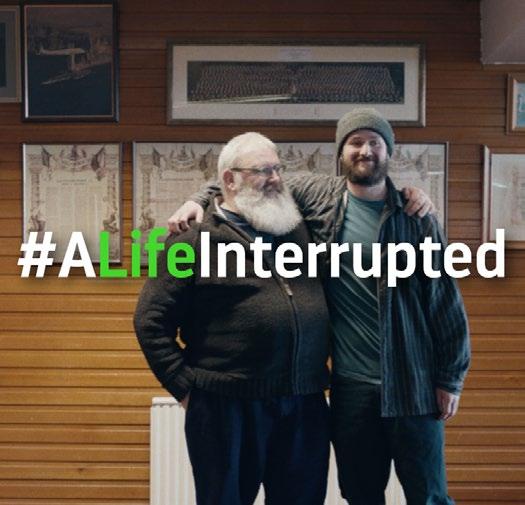
Going Furtherpublished our strategy to capacity build the research environment
Funder Plusinvestment in expert workshops, networking opportunities, increased profile on research
Shape Networkcreated the largest-ever network of researchinterested people affected by epilepsy

14 Epilepsy Research UK Annual Report and Financial Statements - year ended 31 March 2023
2018 2019 2020
2021
end epilepsy into some big ideas. Our campaign called on people affected by epilepsy to join our newly established Shape Network. This network has since become the UK’s largest epilepsy patient and public involvement and engagement (PPIE) group. Over 350 research-interested people affected by epilepsy are now actively involved in our research assessment work and partnering on research programmes.
The following year we published our Going Further strategy, which detailed our plans to enhance epilepsy research on multiple fronts, including a greater focus on capacity-building the research environment. This programme formed the building blocks of this moment – a shift change we believe could deliver our vision of a life free from epilepsy.
One of these building blocks was focusing the research community on what matters most for people with epilepsy. Last year we partnered with the James Lind Alliance (JLA) and National Institute for Health Care Research (NIHR) to identify the Top Ten research priorities for the epilepsy community. This is now providing researchers with the evidence that their research is a priority for people affected by
epilepsy and will lead to increased investment.
To help drive large-scale investment, we have funded and led a national epilepsy research collaborative, #Every1EndingEpilepsy. This research strategy committee is working to design and deliver an epilepsy research roadmap to radically advance research into epilepsy.
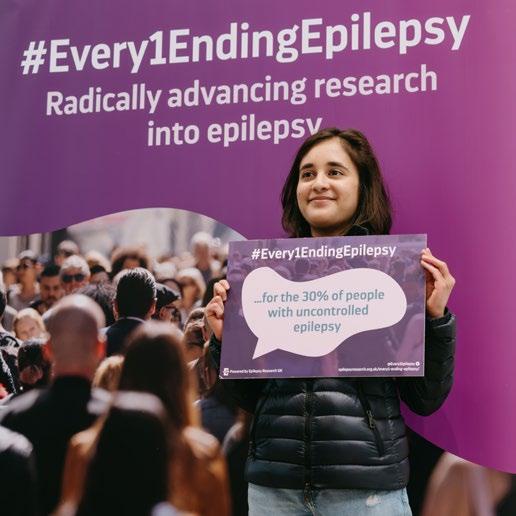

OUR PIVOTAL MOMENT IS NOW
Our work over the last four years has led us to a big moment in our history. In March 2023, we received permission from the government to become the Epilepsy Research Institute UK. The term ‘Institute’ is controlled by the government, and only available to those with a track record of success in their field and who operate nationally at the highest levels. Becoming the Epilepsy Research Institute UK will provide us with the unique capability to convene and coordinate the research community. The Institute will unite everyone in a common purpose to radically advance epilepsy research. If you’d like to read more about this exciting development, go to page 36

#Every1EndingEpilsepy
launched a national research collaborative. developing a roadmap for strategic investment Oct
Epilepsy Research UK Annual Report and Financial Statements - year ended 31 March 2023 15
2022 2023 The InstituteThe Enabler The Connector The Hub
UK Epilepsy
Priority Setting Partnership
-
funded
and led a national consensus to establish the Top Ten priorities for research
-
2023

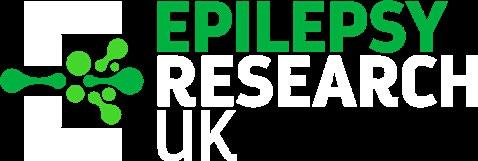
16 Epilepsy Research UK Annual Report and Financial Statements - year ended 31 March 2023 TO ADVANCE THE SCIENCE OF EPILEPSY GOING FURTH R Our strategy to drive investment into epilepsy research 2020 -2025 Click here to read the Going Further strategy on our website
GOING FURTHER
With the publication of our five-year Going Further strategy in 2020, we set out our plans to strengthen the epilepsy research ecosystem through capacity building programmes to support greater investment in research.
Our three strategic priorities detailed how we planned to invest in research and researchers, alongside how we aimed to capacity build the research environment to accelerate progress. Our strategy laid out the path to achieving our ultimate goal, a life free of epilepsy
THREE STRATEGIC PRIORITIES - OUR TARGETED APPROACH
1 PRIORITY 2 PRIORITY 3 PRIORITY
Promote, encourage and fund research into the causes, diagnosis and treatment of epilepsy, and clinical management of people with epilepsy and associated conditions.
Develop the next generation of epilepsy researchers and capacity-build the epilepsy research environment.
Accelerate innovations for people with epilepsy by supporting and commissioning research that will influence clinical practice and health policy.
By the end of this strategy period in 2025, our goal was to have made a significant contribution to levelling up epilepsy research, to inspire young researchers to devote their careers to the field and to see greater collaboration and knowledge sharing across the epilepsy community.
Over the next few pages, you will see the progress we have made on our strategy, and therefore, the progress we have made in driving this change.
Epilepsy Research UK Annual Report and Financial Statements - year ended 31 March 2023 17
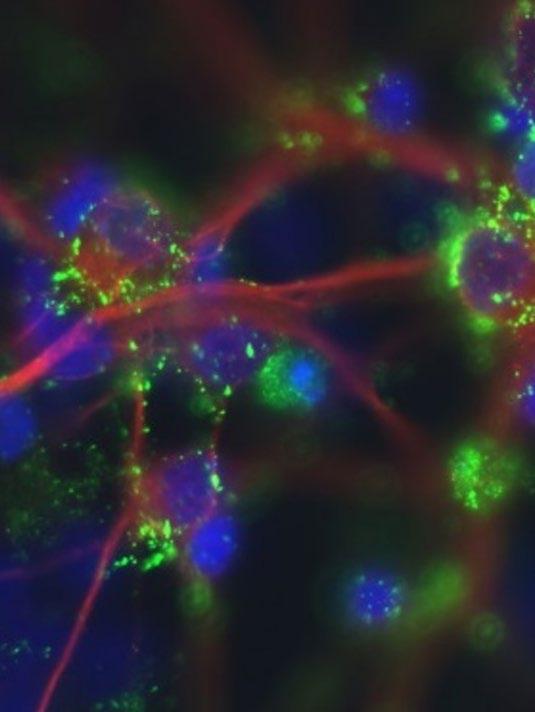
FUNDING CUTTING EDGE RESEARCH
Our annual research awards support only the best research investigating the causes, diagnosis and treatment of epilepsy. Since 2019, Epilepsy Research UK has also been working to build the capacity of the epilepsy research community, through projects such as Doctoral Training Centres and forging partnerships and collaborations with industry and fellow charities.

SUPPORTING RESEARCH AT ALL STAGES
Our annual research awards support projects spanning basic, clinical and data science research to drive innovations in the treatment and prevention of epilepsy. The awards are selected by our Scientific Advisory Committee (SAC) – a panel of the UK’s leading neurologists, neuroscientists and epilepsy researchers. In a nine-month process applications are tested, probed and interrogated. The SAC then recommends the most promising high-quality research to our Board of Trustees.
The potential of this year’s and all previous years’ research awards is huge. From targeting seizures with gene therapy to identifying brain cell mutations, our research is tackling epilepsy and its devastating impact on many fronts. Alongside funding cutting-edge projects, we are also creating leaders in the field through our Fellowship Awards.

MERGING LEADER FELLOWSHIP AWARDS
Our Fellowship Awards provide funding for scientists planning to develop a track record in epilepsy research and transition into a leadership role. The fellow must not only be an excellent candidate, but also submit an exceptional proposal with great potential outcomes for people affected by epilepsy. The fellowships place these ambitious and talented researchers at the heart of epilepsy research, where they can further develop their scientific expertise.
NDEAVOUR PROJECT GRANTS XPLORE PILOT STUDIES
Endeavour Project Grants support fundamental science and clinical research investigating the causes, diagnosis or treatment of epilepsy and associated conditions. These grants help to unlock the promise and potential of early hypotheses, that are based on pilot data by further investigation, with the aim of substantially contributing to furthering knowledge of epilepsy.
Science has to start somewhere. Every breakthrough started with an idea that had to be tested and further developed. Our Explore Pilot Studies provide an opportunity to testbed new ideas and explore novel areas of research. Information gathered from pilot studies enables researchers to obtain larger funding to progress their cutting-edge research.
20 Epilepsy Research UK Annual Report and Financial Statements - year ended 31 March 2023
DOCTORAL TRAINING CENTRE PARTNERSHIPS TO SECURE THE FUTURE OF RESEARCH
We are ensuring we are securing the future of epilepsy research by providing opportunities for the best and brightest young minds to develop into tomorrow’s future clinical and research leaders. In 2022, we set up two Doctoral Training Centres (DTC) at the University of Edinburgh and Newcastle University.
“Doing a PhD can be quite an isolated experience, but through the DTCs we will build cohorts with shared training that spans the whole field of epilepsy research. This will also allow students to place their own research in the wider context of everything, from genetic diagnosis to predicting how seizures develop, from technology to drug development. The Edinburgh and Newcastle DTCs are going to work together to share training, building an even bigger and better cohort effect. Crucially, the experience of people with epilepsy will be embedded throughout this training – their input is vital to ensuring that research is appropriately focused, and who better to inspire the next generation of researchers?”
Professor Cathy Abbot, University of Edinburgh


INVOLVING PEOPLE AFFECTED BY EPILEPSY
Importantly, all research funded through our grant round now involves people living with or affected by epilepsy. Through our Shape Network Application Clinics, researchers and people affected by epilepsy can discuss and debate research grant proposals.
Our Shape Network is now the largest Patient and Public Involvement and Engagement (PPIE) group focused on epilepsy, with over 350 members. For researchers, our network enables studies to be more effective, relevant and cost effective. It also means we can ensure the research we fund is focused on the most important outcomes for people living with epilepsy.
“As a Shape Network member I have been involved with the Application Clinics, through which I, along with other Shape Network members, met with shortlisted grant applicants to discuss their applications, including how best to involve people affected by epilepsy in the research, and how best to communicate this research to a non-scientific audience. It was a fascinating experience and it has been brilliant to see that some of these applications have been awarded funding and I am so excited to hear about their progress in the coming months and years.”
Rebecca, Shape Network member
Epilepsy Research UK Annual Report and Financial Statements - year ended 31 March 2023 21
IMPROVING TREATMENT AND CARE
Epilepsy is a complex condition - not just to manage, but also to research. To push forward the care people living with the condition can access today, we fund healthcare research to build clinical knowledge and influence clinical practice.
The Covid-19 pandemic saw a rapid acceleration in new technologies and remote consultations for routine and emergency care. That’s why in 2020, following an urgent appeal for proposals, we funded urgent ‘Innovations in Healthcare’ grants to drive the development of new innovations that work for people with epilepsy. We have boosted our portfolio of Innovations in Healthcare grants, with further awards made in 2022.
EPILEPSY RESEARCH UK & ANGELINI PHARMA INNOVATIONS IN HEALTHCARE PROJECT
Through our strategic alliance with Angelini Pharma, we awarded Professor Mark Richardson at King’s College London funding for a data-driven research collaboration using artificial intelligence and large-scale NHS clinical data records. In collaboration with Health Data Research UK, the project will seek to understand and predict important clinical outcomes in refractory epilepsy. By identifying new information about the risk factors for developing refractory epilepsy, it will ultimately enable researchers to develop new strategies to prevent it.
“Over the last decade, NHS hospitals have started to adopt electronic systems for collecting medical records. As a result, there is detailed information about health status related to tens of thousands of people with epilepsy. We have developed systems to extract highly detailed information from electronic health records, maintaining confidentiality and privacy of the information. We can analyse this information using artificial intelligence to track the course of epilepsy in thousands of people and make a much better attempt to identify the factors that predict refractory epilepsy.”
Professor Mark Richardson

EPILEPSY RESEARCH UK INNOVATIONS IN HEALTHCARE PROJECT
Dr Owen Pickrell and his colleagues at Swansea University will use artificial intelligence and machine learning algorithms to extract key information from electronic health records to identify risk factors for refractory epilepsy. This is a rapidly developing research area and a valuable investment in this ground-breaking work.

22 Epilepsy Research UK Annual Report and Financial Statements - year ended 31 March 2023
LEVERAGING RESEARCH FUNDING

Over the last five years, our investment in research has leveraged an additional £31.4million in followon funding from other institutional funders – a ratio of £5.94 leveraged funding for every £1 invested by Epilepsy Research UK.

£1 £5.94
Former Emerging Leader Fellow, Professor Gabriele Lignani, is one of the many ERUK-funded researchers who has secured further funding after receiving an ERUK grant. Gabriele has obtained £9 million in follow-on funding and has so far translated his gene therapy in three patients. Gabriele exemplifies the importance of our Emerging Leader Fellowship Award and how it enables researchers to become leaders working on ground-breaking research. It also showcases how our initial investment has leveraged millions in follow-on funding.
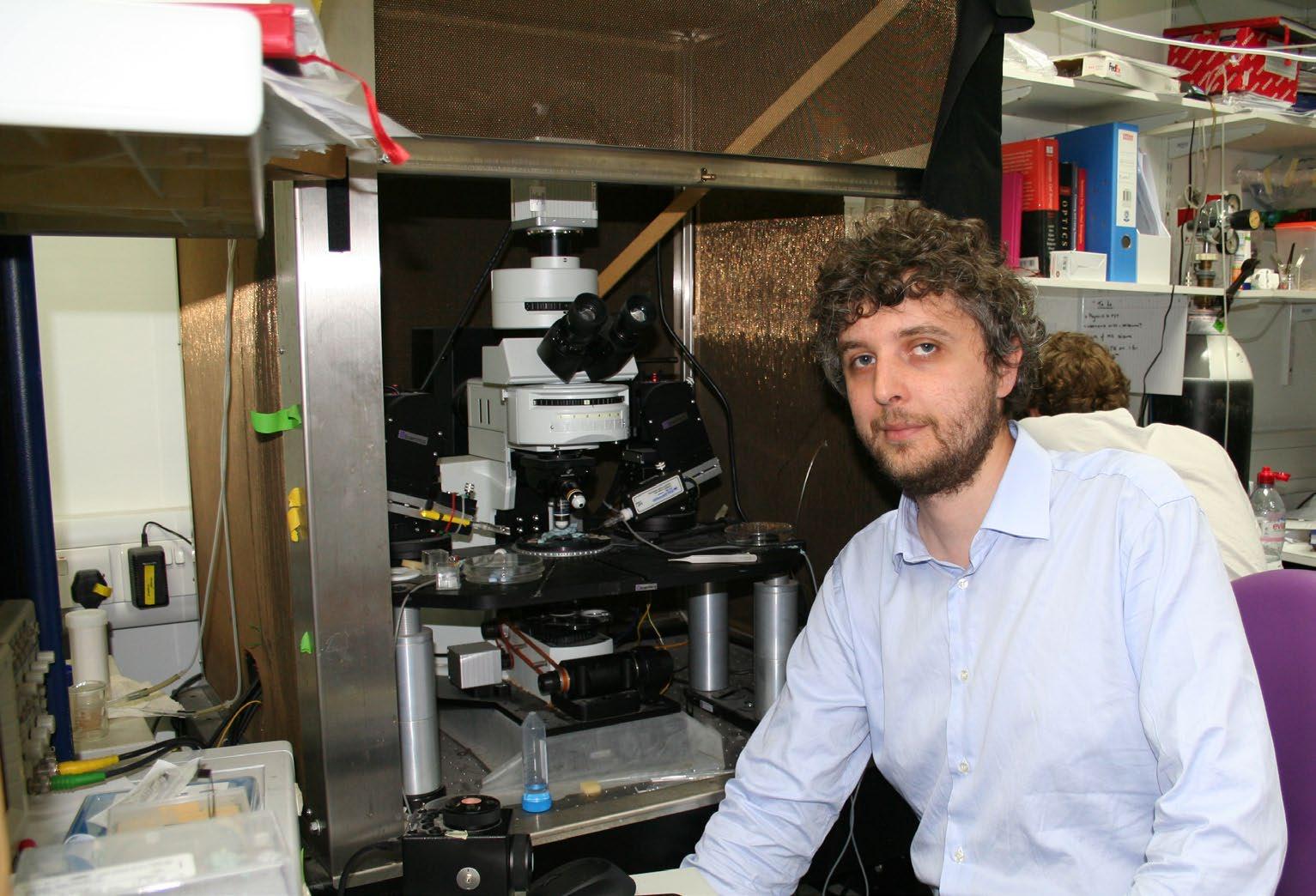
Epilepsy Research UK Annual Report and Financial Statements - year ended 31 March 2023 23
FUNDING COLLABORATIONS AND PARTNERSHIPS
Epilepsy is too big for one charity, for one organisation and for one laboratory. By collaborating with other organisations, we strengthen our fight against the condition. Together we are stronger and only by working together will we stand the best chance of driving forward major innovations.

Epilepsy is not just one condition, it’s an umbrella term for over 40 different conditions and syndromes. It also often co-occurs with other conditions, so by partnering with disease-specific charities, we can help to reveal new insights by sharing our collective expertise. This also avoids duplicating efforts and maximises our research funding and impact.


Over the last three years, we have establish co-funded research fellowship awards with Autistica, Young Epilepsy, Stroke Association and the Association of British Neurologists. In 2022/23, we added to our growing portfolio of co-funded research fellowships with a funding collaboration with the Tuberous Sclerosis Association (TSA) .
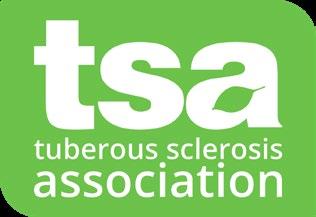




The Epilepsy Research UK Tuberous Sclerosis Association Fellowship Award will support and develop a future leader investigating tuberous sclerosis complex (TSC)-associated epilepsy. This research will improve our understanding of the relationship between TS and epilepsy, offering new targets for the drug and gene therapies so urgently needed for those living with TSC-associated epilepsy.

COLLABORATING FOR CARE
Our collaborations are not just focused on research. Since the publication of our Going Further strategy, we have co-funded healthcare grants with SUDEP Action, Epilepsy Society and Epilepsy Action. These grants enable us to ensure any new development in epilepsy care, particularly those that were brought in during the pandemic, are both effective and designed for people with epilepsy. The study results will be widely shared with both our supporters and the wider epilepsy community.
24 Epilepsy Research UK Annual Report and Financial Statements - year ended 31 March 2023
Dr Amanda Almacellas Barbanoj £249,938 over 30 months awarded in 2023
Further to research and healthcare focused collaborations, we also join forces with other organisations to gather evidence to help inform future research and shine a light on underserviced areas. We worked with Autistica and Young Epilepsy to better understand the prevalence and incidence of epilepsy in autism. The result, an Autism and Epilepsy dossier, highlighted areas where research is needed and where it will make most difference to people who are autistic and have epilepsy.
COLLABORATING WITH CORPORATES AND COUNCILS
Last year, we entered into a new strategic alliance with Italian-based pharmaceutical company Angelini Pharma to support data-driven research into epilepsy. Together, we have commissioned a study that will use large-scale NHS clinical data records to understand and predict important clinical outcomes in refractory epilepsy. We made the first award of this partnership to Professor Mark Richardson at King’s College London in September (see page 22).

In August 2022, we announced a partnership with the Medical Research Council (MRC) Nucleic Acid Therapy Accelerator (NATA), to co-fund a fellowship investigating pioneering, long-term treatments for epilepsy. NATA was founded by the MRC to accelerate the development of these promising new treatments and advance the technology used to manufacture and administer them.
This fellowship award of £250,000 will fund an early-career researcher for two years to investigate the role of nucleic acids in treating epilepsy and become a future leader in this field. During National Epilepsy Week, we announced that Dr José Prius Mengual from the University of Oxford has been awarded funding for this innovative project.

During my previous MRC early career position, I collaborated in investigating the molecular and electrical signatures of epilepsy in the brain. This experience has made me acutely aware of the pressing need for novel approaches in treatments against epilepsy. Innate curiosity and a drive to improve things have motivated me to develop a project focused on genetic therapies, that will ultimately result in better clinical interventions and aim to significantly improve the lives of people affected by epilepsy. I am eagerly looking forward to seeing the positive impact my efforts will have on people’s lives.
Dr José Prius Mengual
Epilepsy Research UK Annual Report and Financial Statements - year ended 31 March 2023 25

BUILDING THE EPILEPSY RESEARCH ECOSYSTEM
We want research to thrive, so we must develop an environment that will culture it, grow it, and house it in the best place possible to deliver for people living with epilepsy. We do this by building a healthy ecosystem – one that is transparent, where information is freely shared, and one that supports and encourages researchers to carry out high quality research.

DISSEMINATING KNOWLEDGE
We know information sharing encourages connections and collaborations between researchers. It allows researchers to build on the work of others and informs their future research. This year, we continued to grow our dissemination activities.



EPILEPSY RESEARCH UK AT THE ILAE 2022 ANNUAL SCIENTIFIC MEETING


World-leading clinicians and researchers gathered for the International League Against Epilepsy (ILAE) Annual Scientific Meeting in October 2022, to hear the latest developments in areas including novel treatments, artificial intelligence and neurosurgery. The work of Epilepsy Research UK featured heavily throughout the conference, including the unveiling of the Top Ten research priorities of the UK Epilepsy Priority Setting Partnership (PSP) and the #Every1EndingEpilepsy programme.
There were 15 Epilepsy Research UK-funded researchers, trustees and SAC members chairing sessions and discussing findings from their pioneering projects, and for the first time, PhD students from our two Doctoral Training Centres also attended. Once again, we ran the Neurobiology of Epilepsy session, where we heard from shortlisted early career researchers competing for the Céline Newman Neurobiology of Epilepsy Prize. This year’s award went to PhD student Kate Hills from the University of Manchester, for her presentation on ‘Mapping epileptiform activity using graphene-based thin film devices in a model of glioblastoma-associated epilepsy.’
FIRST NAVIGATOR SERIES SYMPOSIUM ON GENETIC THERAPIES
For over a decade, our International Expert Workshops acted as a catalyst for collaborative research activity, bringing together hundreds of researchers from around the world. The COVID-19 pandemic temporarily halted our workshop programme, but we continued to promote the sharing of ideas and collaboration through the launch of the Navigator Series. In February 2023, leaders in genetic therapies for epilepsy from across the UK and Europe came together for the inaugural Navigator Series symposium. The one-day conference focused on genetic therapies for epilepsy and was chaired by Emerging Leader Fellow Dr Gareth Morris and our Scientific Advisory Committee Chair, Professor Michael Cousin.
28 Epilepsy Research UK Annual Report and Financial Statements - year ended 31 March 2023
COMMUNICATING RESEARCH
We are determined to ensure people affected by epilepsy and our supporters are able to stay up-to-date and informed about the research we fund. This year we continued to use our website as a hub for all the latest information and news on epilepsy research, through blogs and webinars.
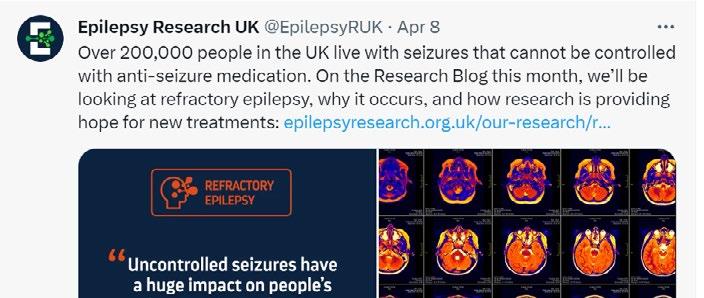
Our Research Blogs provide an opportunity for clinicians, researchers and people affected by epilepsy to discuss research and epilepsy, with features on epilepsy and pregnancy, SUDEP, research participation and our Innovations in Healthcare Awards.










Epilepsy Research UK Annual Report and Financial Statements - year ended 31 March 2023 29
INFLUENCING CHANGE
For a condition affecting so many, epilepsy has historically received so little. So little funding, so little attention, so little investment. Epilepsy Research UK is at the heart of rallying and building a community of those affected by epilepsy, researchers charities and other organisations to focus on epilepsy research and share a united voice calling for change.

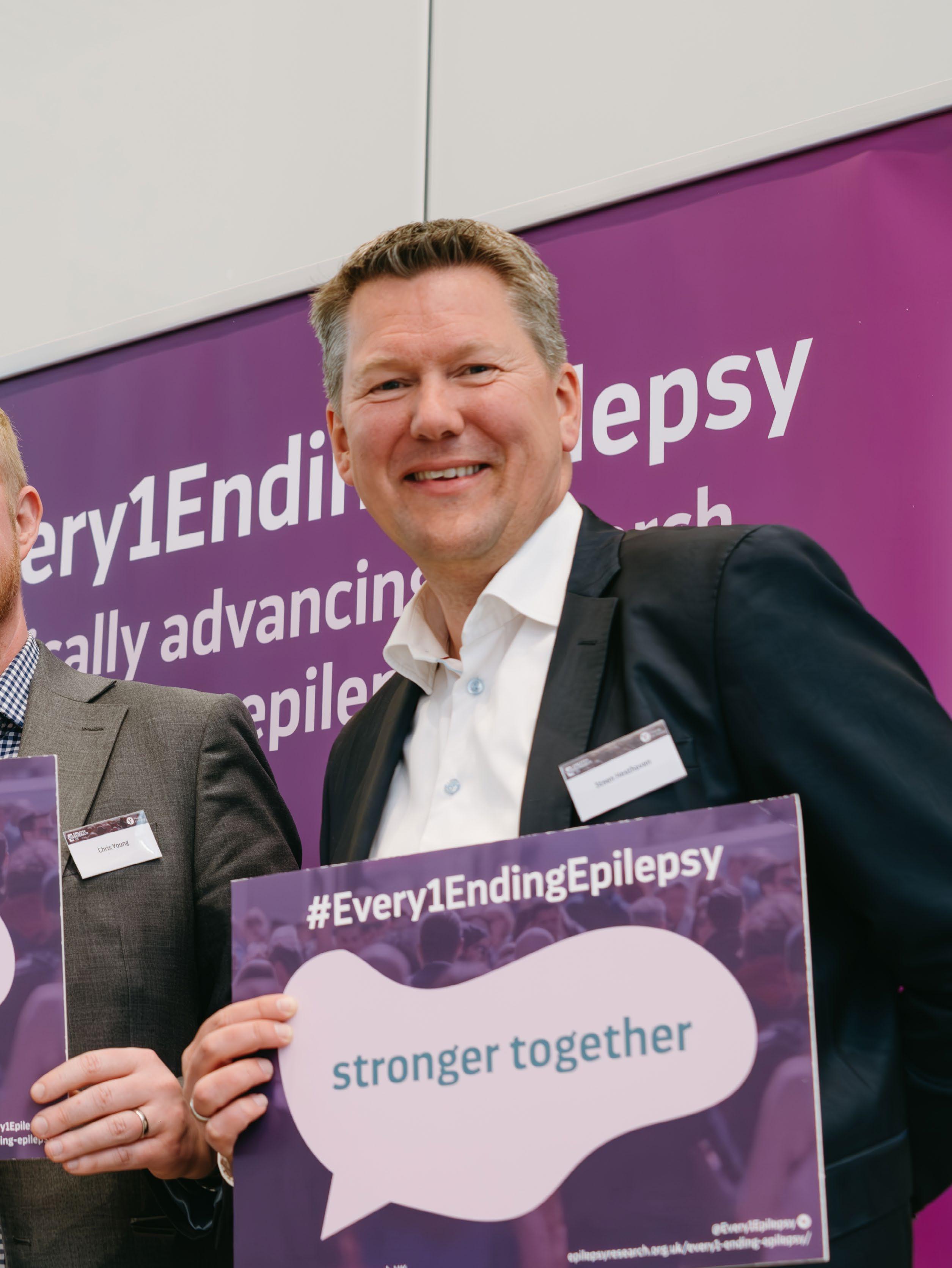
FINDING OUR VOICE
In 2018, we found and raised our voice. We called out the glaring inequities in epilepsy research funding compared to other, less-prevalent conditions with the publication of our report, #ALifeInterrupted. The subsequent award-winning campaign featuring Doug and Ava, who are both living with epilepsy, shone a light on the human cost of the chronic underinvestment in epilepsy research.


Despite epilepsy being one of the most common, serious neurological conditions, just 0.3% of the £4.8 billion spent on health-related research is invested in epilepsy research.
epilepsy research other health-related research
This report was a significant chapter for Epilepsy Research UK, in that it led to the formation of our Shape Network patient and public involvement and engagement (PPIE) group. The network has since grown to be the UK’s biggest communities of research-interested people living with epilepsy.
These two significant developments firmly put Epilepsy Research UK at the heart of rallying and building a community of people affected by epilepsy, researchers, charities and other organisations to focus on epilepsy research and share a united voice calling for change.
Our voice has since gotten stronger, enabling us to directly influence the landscape of epilepsy research. We have pushed for (and delivered) solid evidence to inform future research and healthcare innovations. We have rallied the community. And we will influence government and other funders to invest more into research. These next few pages will tell you how.
32 Epilepsy Research UK Annual Report and Financial Statements - year ended 31 March 2023
IDENTIFYING RESEARCH PRIORITIES
In 2022/23, we funded and led the UK Epilepsy Priority Setting Partnership (PSP). This landmark engagement programme was a once-in-a-generation, national consensus that collated and ranked the research priorities of the UK’s epilepsy community to identify the Top Ten. By delivering the PSP Top Ten, we are influencing the direction of epilepsy research and ensuring we are focussed on the areas that matter most to the those affected.
This past year, we have continued to develop our plans for how we can best support research that answers the questions raised in the PSP. The research priorities also now form part of our SAC funding assessment process, and all the projects we fund must be related to the Top Ten unanswered research questions.

On the next page, you will read about the #Every1EndingEpilepsy national collaborative and how the PSP priorities have been integrated into the planning and shaping of a research roadmap and strategy. Read more about the process on page 34


Epilepsy Research UK Annual Report and Financial Statements - year ended 31 March 2023 33
RADICALLY ADVANCING RESEARCH INTO EPILEPSY
#Every1EndingEpilepsy is our programme to radically advance research into epilepsy through investment, collaboration and action. In May 2022, we presented the programme at a research reception held at the Francis Crick Institute.
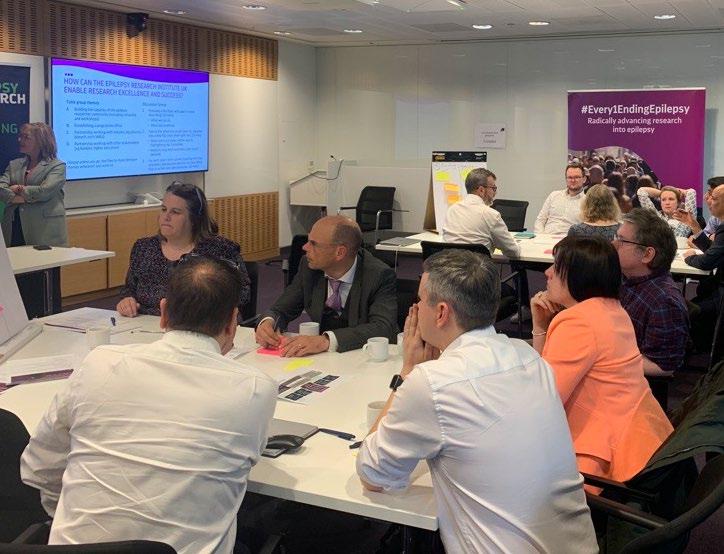
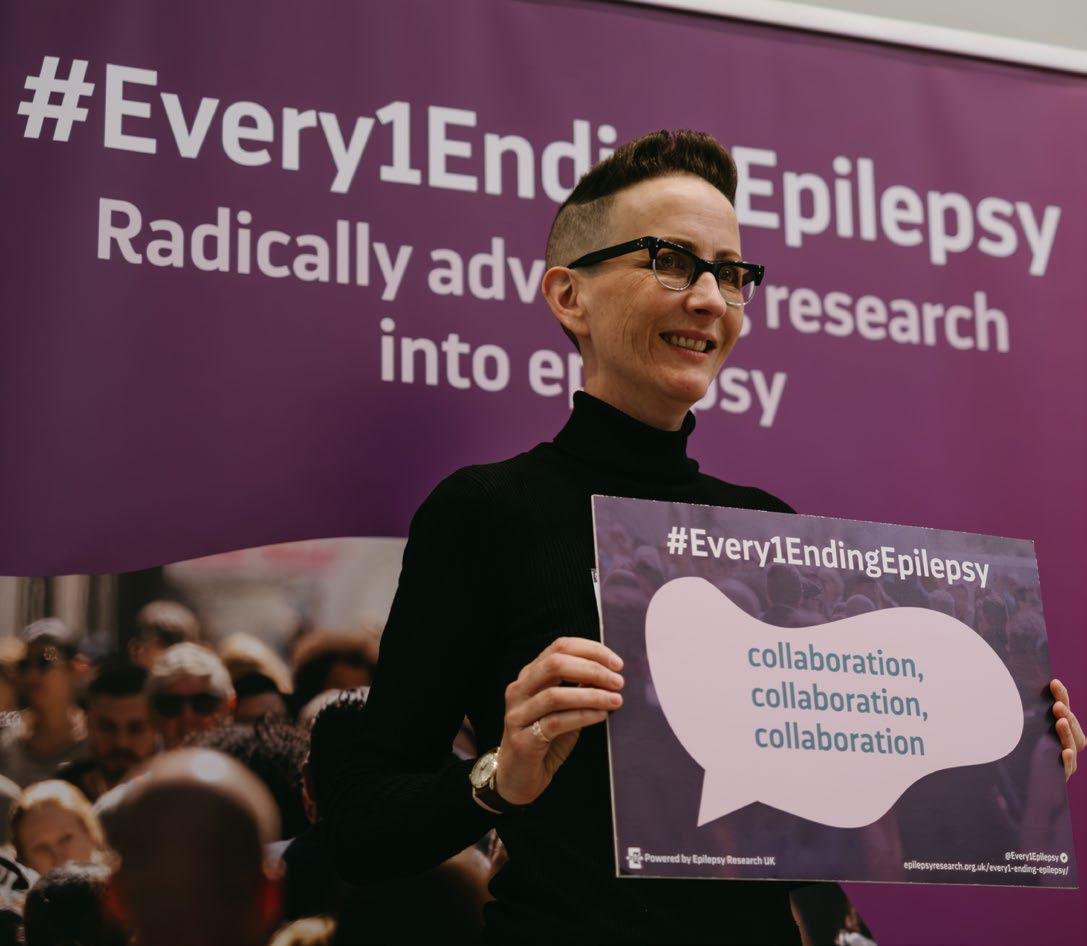
The event showcased #Every1EndingEpilepsy, featuring inspirational contributions from people affected by epilepsy and examples of the ‘PSP in Action’ presented by Dr Tim Tierney, Dr Zelekha Seedat and Professor Gabriele Lignani.
We are working to deliver a research framework and campaign to drive strategic investment, seeking a one-off multi-million-pound accelerator investment from institutional funders, and a commitment to long-term, sustainable funding for epilepsy research. Since the programme launched in 2022, we have brought together epilepsy research experts from across the country, building on their existing strengths, knowledge and experience to identify the challenges and gaps that must be urgently addressed to increase the capacity and capability required to fast-track research into epilepsy.
WORK IN 2023/24
We are now developing a roadmap using the four themes from the PSP. We will be calling on the epilepsy community to help us publicise the road map and encourage institutional funders to invest in the future of epilepsy research.
In 2024 we will launch a strategic communications campaign led by people affected by epilepsy, which will call on institutional funders to commit to a research investment of £100 for everyone living with epilepsy in the UK – that’s £100 for every 1 in 100 – a £60 million total accelerator fund. We have seen this approach work in other disease areas. The time is now to level-up funding for epilepsy research.

34 Epilepsy Research UK Annual Report and Financial Statements - year ended 31 March 2023


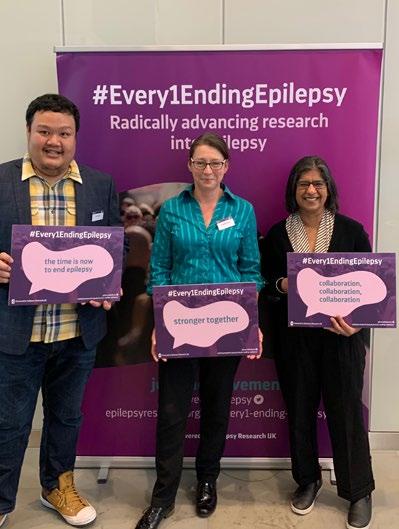

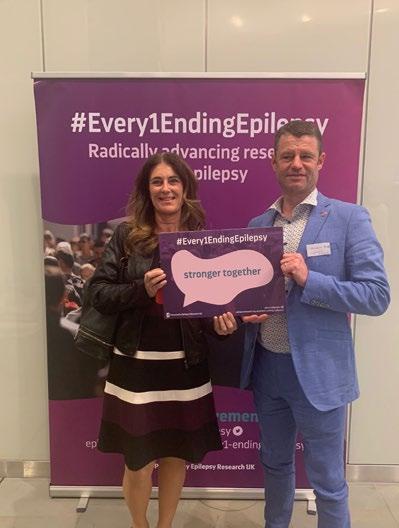
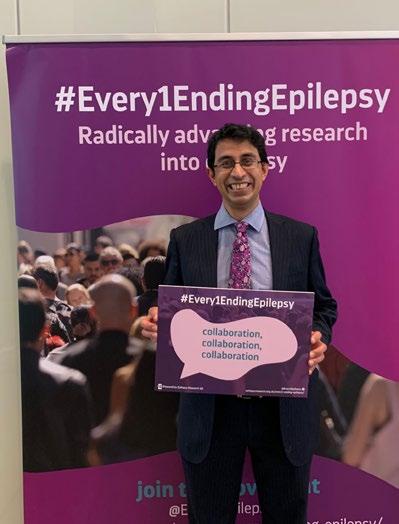

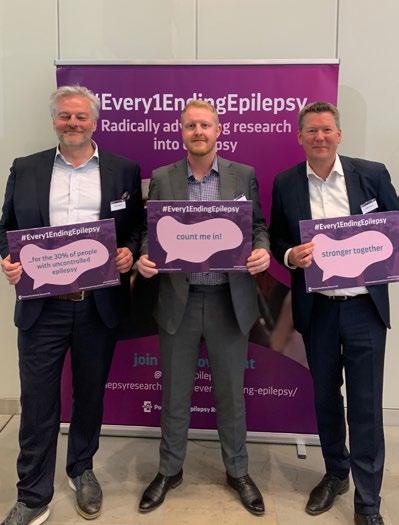








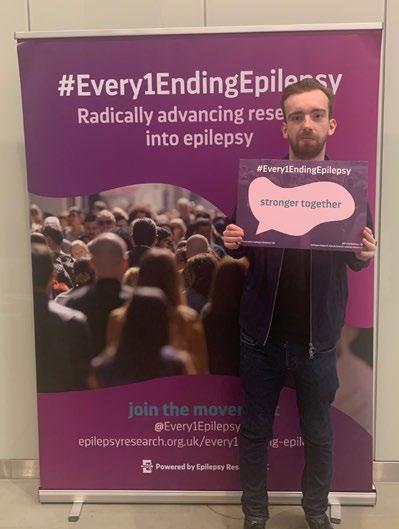
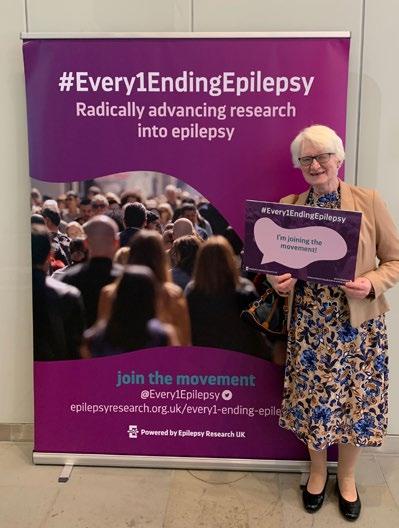

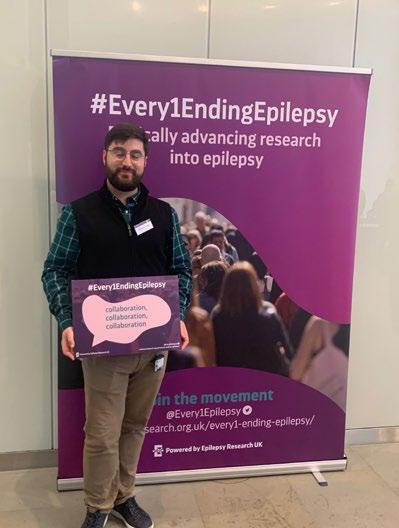





Epilepsy Research UK Annual Report and Financial Statements - year ended 31 March 2023 35
THE INSTITUTE
At our research reception in May, George Freeman MP, Minister of State for Science, Research & Innovation, unveiled our plan to establish a national research institute. The Institute will drive strategic investment and capacity build the research ecosystem to radically advance the treatment and prevention of epilepsy.

I fully support the formation of the Epilepsy Research Institute UK. It is clear that progress will not be achieved by some extraordinary discovery one afternoon in a laboratory, but by incremental aggregation of different disciplines, multidisciplinary working partnerships and a combination of deep biological science, neural pathway mapping, AI and technologies that require our top laboratories, and research institutes around the world to work together.
 George Freeman MP Minister of State for Science, Research and Innovation
George Freeman MP Minister of State for Science, Research and Innovation
Epilepsy Research UK Annual Report and Financial Statements - year ended 31 March 2023 37
WHAT THE INSTITUTE WILL DO
In October 2023, Epilepsy Research UK will become the Epilepsy Research Institute UK. Our vision of a life free from epilepsy remains unchanged. But our mission and purpose has now broadened. As the Institute, our mission is to radically advance research into the causes, prevention and treatment of epilepsy.
OUR PURPOSE:
1. Convene, connect and capacity build the epilepsy research ecosystem
2. Drive strategic investment in epilepsy research
3. Fund research into epilepsy and associated conditions
4. Develop research partnerships and collaborations
5. Advocate and action the research priorities of people affected by epilepsy
The Institute will serve as a central hub for the epilepsy research ecosystem, developing partnerships and collaborations between academia, the NHS, industry, funders and patient organisations. Our ambition is to accelerate innovations for the 1 in 100 people living with epilepsy in the UK through increased strategic research investment, capacity building and research translation.
The Institute will embed the research programmes developed by the #Every1EndingEpilepsy steering group and use our influence to drive strategic investment into epilepsy research, creating a strong, vibrant and well-funded epilepsy research ecosystem.
38 Epilepsy Research UK Annual Report and Financial Statements - year ended 31 March 2023
OUR FOUNDING PARTNERS
We are proud to be joined by Young Epilepsy, Epilepsy Action, Epilepsy Scotland and the International League Against Epilepsy (ILAE) British Branch as the Founding Partners of the Epilepsy Research Institute UK. Our alliance and commitment to this mission aims to set the tone for a multidisciplinary culture of collaboration. We would like to thank the four Founding Partners for their unwavering leadership and support in developing an institute that will belong to everyone.
“Living a life free from epilepsy can only be achieved through research. The Epilepsy Research Institute UK will unite the epilepsy community in our collective ambition to stop epilepsy interrupting lives.” Epilepsy Research UK Chair, Professor Matthew Walker

“The Institute will be pivotal in helping us to develop our UK capacity which ultimately will have an impact worldwide.” Epilepsy Research UK President and ILAE Global President, Professor Helen Cross OBE

“We are absolutely delighted to be a founding member of the Epilepsy Research Institute. The plan to unite the Epilepsy community in the UK to better the lives of those with epilepsy through collaborative working is so needed and so welcomed.” ILAE British Branch Chief Executive, Juliet Solomon
“We’re delighted to be involved in the Epilepsy Research Institute UK as a Founding Partner. The Institute will drive much-needed investment into epilepsy research, putting the voices of people with the condition right at the heart of that work.” Epilepsy Action Chief Executive, Philip Lee

“Working together as a Founding Partner of the national Epilepsy Research Institute UK will unlock the collaborative power of a strong multi-organisational research ecosystem driving vital research forward in a bid to accelerate innovations.” Young Epilepsy CEO, Mark Devlin

“This is a pivotal time for those of us who represent such a large group of people and the Epilepsy Research Institute UK is exactly the right vehicle to significantly improve the lives of people living with epilepsy both in Scotland and across the United Kingdom.” Epilepsy Scotland CEO, Lesslie Young

Epilepsy Research UK Annual Report and Financial Statements - year ended 31 March 2023 39


















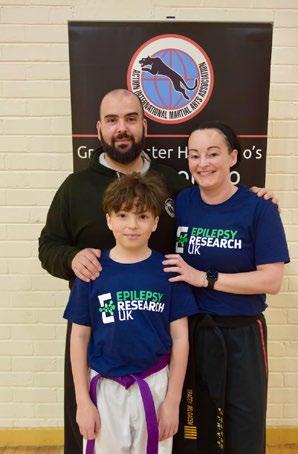



























40 Epilepsy Research UK Annual Report and Financial Statements - year ended 31 March 2023
THANK YOU

Without your support, we would not have reached this pivotal point in our charity’s development. From those who donated a few pounds from a charity boot sale to those who left substantial gifts to Epilepsy Research UK in their Will, we want to say a heartfelt thank you to you all.




























The countless projects funded, the research breakthroughs and the creation of the Epilepsy Research Institute UK are your achievements.




Epilepsy Research UK Annual Report and Financial Statements - year ended 31 March 2023 41
TRUSTEES’ REPORT AND FINANCIAL STATEMENTS YEAR ENDING 31ST MARCH 2023
The directors hereafter referred to as the trustees are pleased to present their annual directors’ report together with the financial statements of the charity for the year ending 31st March 2023 which are also prepared to meet the requirements for a directors’ report and accounts for Companies Act purposes.
The financial statements comply with the Charities Act 2011, the Companies Act 2006, the Memorandum and Articles of Association, and Accounting and Reporting by Charities: Statement of Recommended Practice applicable to charities preparing their accounts in accordance with the Financial Reporting Standard applicable in the UK and Republic of Ireland (FRS 102) (effective 1 January 2015).
Reference and administrative details
Directors and Trustees
The Directors of the charitable company and its trustees for the purposes of charity law serving during the year, and since the year end, were:
Professor Matthew Walker MA MB BChir FRCP PhD (Chair)
Mr Barrie Akin LLB FCA
Mr Joseph Brice BA (Hons)
The Rt Hon David Cameron
Professor Michael Cousin BSc, PhD
Dr Anne Coxon DPsych
Professor Martin Elliot MB BS, MD, FRCS, FRSA (appointed June 2022)
Ms Mary Gavigan BBS MA FCA (resigned December 2022)
Dr John Hirst CBE BA FCA MCT CCBIM DSc (resigned September 2022)
Professor Tony Marson, MB ChB, MD, FRCP, FEAN (appointed March 2023)
Professor Nicholas Lench BSc, PhD, FRCPath
Professor Mark Richardson MA BMBCh MRCP PhD CCST FRCP
Mr Harry Salmon BA (resigned September 2022)
Professor Stephanie Schorge BSc, PhD, SFHEA
Ms Judith Spencer-Gregson FCA MSc
Dr Rhys Thomas BSc, MBChB, MRCP, MSc, PhD
Dr Sukhvir Wright BSc, MBBS, PhD (appointed March 2023)
President
Professor Helen Cross MB ChB PhD FRCP(UK) FRCPCH
Chief Executive
Ms Maxine Smeaton MSc PGDip MInstF
Independent auditors
Kreston Reeves, Springfield House, Springfield Road, Horsham, West Sussex, RH12 2RG
Bankers
CAF Bank Ltd, PO Box 289, Kings Hill, West Malling, Kent, ME19 4TA
Lloyds Bank, 308-312 Chiswick High Road, London, W4 1NS
Solicitors and Company Secretary
A J Lutley, Springfield, Rookery Hill, Ashtead Park, Ashtead, Surrey, KT21 1HY
Registered and Head Office
Charity number 1100394
Company number 4873718
7-14 Great Dover Street
London SE1 4YR
Epilepsy Research UK Annual Report and Financial Statements - year ended 31 March 2023 2
Objectives and activities for the public benefit
The trustees have complied with their duty according to Section 17(5) of the Charities Act 2011. To achieve this, the Charity reports that it offers the following public benefit:
The objects of the charity are:
• to promote, encourage and finance research into epilepsy and associated conditions and their underlying causes;
• to promote and improve the treatment, care and welfare of persons affected by epilepsy and associated conditions; and
• to advance the general education and understanding of the public concerning the nature and causes of epilepsy and associated conditions and the treatment thereof.
In shaping our objectives for the year and planning our activities, the trustees have considered the Charity Commission’s guidance on public benefit, including the guidance ‘public benefit: running a charity (PB2)’. The objectives set out in the charity’s business plan for the year are shaped by these aims with a view to funding an increasing programme of research, encouraging collaboration amongst researchers and raising awareness of the need for more funding for epilepsy research.
Strategy
When Epilepsy Research UK was formed in 2008, our mission was clear – to drive forward research into epilepsy. Over the last 15 years we have steadily grown our income, our research investment and our influence.
We’re now in a position to award £1.7 million a year in fellowships, PhD studentships and research grants, building the capacity of epilepsy research centres throughout the UK. We currently fund over 80 projects, including clinical research to advance the medical care and management of people living with epilepsy, and lab-based scientific research investigating causes and methods for improving diagnosis, treatment and prevention of epilepsy.
Since formation our ambition to end epilepsy has never faltered. But, we know there is much more to be done. While the research we fund has led to clinical innovations and sparked further investment, progress for epilepsy has lagged behind other conditions.
Epilepsy research has been chronically underfunded. This has greatly hampered progress and is the reason why today, much like back in 2008, hundreds of thousands of people are still living with the threat of uncontrolled seizures and why 3 people every day still lose their lives.
In 2018 we highlighted the stark inequalities in neurological research funding when we published our #ALifeInterrupted – Shaping the Future of Research into Epilepsy report. Alongside this we launched a campaign to raise awareness of the underfunding of epilepsy research.
But raising awareness needed to be backed with action, and we decided to channel our ambition to end epilepsy into some big ideas to shift the dial in our favour. Our campaign called on people affected by
3 Epilepsy Research UK Annual Report and Financial Statements - year ended 31 March 2023
epilepsy to join our newly established Shape Network. This network has since become the UK’s largest epilepsy patient and public involvement and engagement (PPIE) group. Today, over 350 research-interested people affected by epilepsy are now actively involved in our research assessment work and partnering on research programmes.
The following year we published our Going Further strategy, which detailed our plans to enhance epilepsy research on multiple fronts, including a greater focus on capacity-building the research environment. This programme formed the building blocks to a step change we believe could deliver our vision of a life free from epilepsy.
One of these building blocks was focusing the research community on what matters most for people with epilepsy. Last year we partnered with the James Lind Alliance (JLA) and National Institute for Health Care Research (NIHR) to identify the top ten research priorities for the epilepsy community. Throughout 2022/23 we have continued to disseminate the priorities and now researchers are using this evidence to underpin funding applications that demonstrate their research is a priority for people affected by epilepsy. This will, without doubt, lead to increased investment.
To help drive large-scale investment, this year we have rolled out the #Every1EndingEpilepsy programme. This national collaborative has brought together the epilepsy research community, epilepsy patient groups to design and delivery a research roadmap to radically advance research into epilepsy.
Our work over the last four years has led us to a huge moment in our history. In March 2023, based on our track record of being exclusively dedicated to capacity building the epilepsy research environment, we received permission from the government to become the Epilepsy Research Institute UK. The term ‘Institute’ is controlled by the government, and only available to those with a track record of success in their field and who operate nationally at the highest levels.
Becoming the Epilepsy Research Institute UK will provide us with the unique capability to convene and coordinate the research community. The Institute will unite everyone in a common purpose to radically advance epilepsy research. We have begun our plans for transition and look forward to an exciting and impactful year ahead.
Volunteers
We are grateful for the significant support we receive from the members of the Trustee Board and the Scientific Advisory Committee who all provide their extensive knowledge, skills and experience in order to further the objects of the charity.
Going Concern
The Trustees are confident that with the strategy to become the Epilepsy Research Institute we will be eligible to apply for strategic investment from institutional funders. We are also holding unrestricted funds at 31 March 2023 of £3,394,171.
The reserves policy has therefore proved to be adequate to enable Epilepsy Research UK to meet its commitments without any adverse impact on our research activities.
Epilepsy Research UK Annual Report and Financial Statements - year ended 31 March 2023 4
Research grants in 2023
In 2022/23 we continued to advance knowledge of epilepsy by funding 12 new projects, spanning basic, clinical and data science studies. The awards were selected by our Scientific Advisory Committee (SAC), a panel of the UK’s leading neurologists, neuroscientists and epilepsy researchers. The process is rigorous and takes nine months from first stage applications. Applications are tested, probed, interrogated, and then the SAC recommends the most promising high quality research to our Board of Trustees for funding.
The potential of this year’s research awards, all focused on driving innovations in treatment and prevention of epilepsy, is huge. From targeting seizures with gene therapy to identifying brain cell mutations, our research is tackling epilepsy and its devastating impact on many fronts. Alongside funding cutting edge projects, we are also creating leaders in the field through our Fellowship Awards.
TITLE
Targeting seizures and cognitive comorbidities with gene therapy
target discovery for Tuberous Sclerosis treatment
New therapies against epilepsy combining sleep and cellular stress genes
Adapting and evaluating a problem-solving intervention for children aged 9-12 years with epilepsy
Can metabolism of lysine be targeted to treat epilepsy in tuberous sclerosis complex (TSC)?
Do babies with genetic epilepsy have more excitable neurons?
How safe are anti-seizure medicines used in pregnancy?
Investigating anti-seizure medications and breastfeeding using the UK and Ireland Epilepsy and Pregnancy Register
How can the new generation of MEG machines help patients awaiting epilepsy surgery?
Identification of brain cell mutations in focal epilepsy
Using Natural Language AI to identify predictors of refractory epilepsy in NHS Electronic Health Records
Using large-scale data and artificial intelligence for refractory epilepsy research
APPLICANT INSTITUTION
We are currently funding 80 projects in total, approved in prior years, at institutes around the country, examples of which include 13 PhD studentships across two Doctoral Training Centres in Newcastle and Edinburgh, as well as studies investigating ground-breaking gene therapy techniques to prevent seizures and novel neuroimaging studies to make bedside brain imaging a reality.
5 Epilepsy Research UK Annual Report and Financial Statements - year ended 31 March 2023
AMOUNT LEAD
£246,016 Dr Amy Richardson UCL Queen Square Institute of Neurology New
£249,939 Dr Amanda Almacellas Barbanoj UCL Queen Square Institute of Neurology
£245,963 Dr José Prius Mengual University of Oxford
£155,584 Prof Anna Adlam University of Exeter
£174,495 Dr Felix Chan Aston University
£163,444 Dr Amy McTague UCL Great Ormond Street Institute of Child Health
£173,842 Dr Anita McGrogan University of Bath
£29,969 Dr John Craig Belfast Health & Social Care Trust
£29,583 Dr Caroline Witton Aston University
£29,988 Prof Maria Thom UCL Queen Square Institute of Neurology
£199,595 Prof Mark Richardson King’s College London
£50,000 Dr Owen Pickrell Swansea University
Total
£1,748,418
grants awarded
Research value and impact
The Association of Medical Research Charities (AMRC) membership is the hallmark of quality research funding. It means that we fund highquality, peer-reviewed work and that our research procedures are audited every five years in order to check that they meet the gold standard. For universities, government and other funding bodies, AMRC membership is a recognised indicator of quality, and it qualifies our grants for support from the government’s Charity Research Support Fund, which entitles universities to at least a 20% increase on our funding. As AMRC members, we are also provided with access to training alongside other research charities to share ideas and ensure we are operating best practice processes and procedures.
The research we fund will ultimately be of benefit to people with epilepsy as our understanding of the condition grows. Often the research we fund is the first step in a long journey to developing new treatments. One way we gauge the success of these early-stage projects is by assessing the level of funding they subsequently secure from other funders to progress the work.
We closely monitor the impact of our grants to ensure that donations support research of the highest quality. We do this via a reporting platform called ‘Researchfish’, which is used by a growing network of funding bodies and universities in the UK and Europe. Researchfish enables our researchers to tell us, in detail, about where their findings have been disseminated and the impact, they might have on future epilepsy research, scientists’ careers and, most importantly, people with epilepsy.
In the last five years we have invested over £5.3 million on research grants and these have leveraged over £31.4 million in follow-on funding from other sources. Therefore, every pound invested by Epilepsy Research UK has generated a further £5.94 for epilepsy research. This investment in epilepsy research demonstrates our ability to identify innovative research at an early stage that will ultimately benefit people with epilepsy.
Another indicator of the quality of the research we fund is the number of publications that arise
from the work. Over 400 journal publications have resulted from ERUK grants during the 2009 – 2023 period, 93 of which were in high impact journals (IF of 10 or above) such as Brain, Nature and Science. Further evidence of the quality of the work we fund is the number of citations these publications have achieved (ie the number of times the publications have been referred to by other researchers in their own work). In this case our publications have been cited over 4,000 times.
Fundraising performance in 2022/23
The overall incoming resources from fundraising and trading activities during 2022/23 were £2,508,370 an increase in income of 102% compared to the previous year. This was largely boosted by grants of £1,284,839 for existing early career researchers from BEIS in recognition of the losses experienced by medical research as a result of Covid-19. Legacy income in the year was £928,728. Given the highly unpredictable nature of legacies, the Board has taken the decision to phase the research grant allocations to ensure we have a secure grant round for the next few years. This funding has also enabled the board to consider investment in a strategic opportunity.
Our fundraising approach
Last year, 100% of our fundraised income primarily came from our community of supporters and trusts and foundations. We greatly appreciate and recognise the importance and value of the relationship with our supporters. We ensure our supporters are informed and inspired by the way the organisation both raises and spends its funds. We are mindful of the impact inflation and the costof-living crisis will have on our supporters and will ensure that we are clear in demonstrating the impact of our work and that our fundraising targets and campaigns are appropriate.
Many of our supporters take part in events to raise money through sponsorship. Whilst in-person events are beginning to return to normal, we continue to offer a range of virtual events to take part in. Where events take place in person, we have clear written contracts with suppliers and there is full transparency of the costs involved.
Epilepsy Research UK Annual Report and Financial Statements - year ended 31 March 2023 6
We are registered with the Fundraising Regulator and work to ensure that all our fundraising is carried out to recognised standards. We do not directly fundraise or market to individuals who have not signed up as supporters or agreed to receive mail from the charity with news, information and fundraising opportunities. We have a clear set of guidelines for people who fundraise on our behalf and these are sent to and agreed by the fundraiser in advance of any activity.
We have had no complaints about our fundraising approach in the past year. Our fundraising is “light touch” rather than being intrusive or pressuring and we feel that this is appreciated by our supporters and donors.
General Data Protection Regulations (GDPR)
We undertake regular reviews of our systems, processes and data to ensure we are GDPR compliant. As we moved to a hybrid working model in 2021 we developed a plan to ensure we remained compliant. We use VPNs to safeguard access to our donor database and operate a no-paper policy so that all communications are held digitally on our secure environment.
Financial review
In 2022/23 our overall incoming resources were £3,605,370 and the costs of raising funds were £173,303 leaving £3,432,067 available for charitable activities. This was an increase in net income of £753,294 compared to the previous year. The total spent on charitable activities was £2,485,123.
This year we were fortunate in receiving further grants of £1,284,839 from the government to compensate for delays to research for early career researchers. We also had exceptional levels of legacy income. The current level of legacy income has enabled a designated research fund to be put aside to be utilised over subsequent years to deliver the development of the research strategy. By utilising the designated research fund we were able to award grants in 2023 of £1,758,950 an increase of 12% over 2022. It is envisaged the impact of the Covid pandemic and cost of living crisis will continue to influence income over the next couple of years and the designated research fund at 31 March 2023 will
be utilised to try to maintain research grants at a similar level for the foreseeable future.
Bank balances of £3,557,081 are held for ongoing and future grant commitments and day to day liabilities. The trustees, having regard to the liquidity requirements of research grants awarded, need to ensure that funds are available to meet our commitments.
Specific investment powers of the trustees
The trustees, having regard to the liquidity requirements of research grants awarded, have kept available funds. Due to wider economic circumstances deposit rates have been depressed. Mindful of the low returns, the trustees placed some funds in medium and long term investments. There was significant volatility in investment performance during the year following overseas hostilities and the impact of rising interest rates on bond returns. There was an unrealised loss on investment values within the year of £263,090.
Structure, governance and management Governing document
Epilepsy Research UK (ERUK) is a charitable company limited by guarantee, incorporated (as Epilepsy Research Foundation) on 21st August 2003 and registered as a charity on 30th October 2003. The company is governed by its Memorandum and Articles of Association. On 22nd March 2007, The Memorandum and Articles of Association were amended by a special resolution to change the name of the company from Epilepsy Research Foundation to Epilepsy Research UK (as part of the merger process with the Fund for Epilepsy) and the company was registered with Companies House under this name on 30th March 2007. In the event of the company being wound up members are required to contribute an amount not exceeding £1.
Appointment of trustees
As set out in the Articles of Association the trustees are appointed by the Board of Trustees. The Articles of Association provide for a minimum of 7 and a maximum of 16 trustees. At each Annual General Meeting one third of the trustees must put themselves forward for re-appointment. The Board
7 Epilepsy Research UK Annual Report and Financial Statements - year ended 31 March 2023
takes account of the skills and experience of its members when seeking to recruit new trustees and aims to recruit at least one new trustee each year. New trustees are selected as a result of nomination from members of the Board and through open advertisement.
Trustee induction and training
Following a governance review undertaken by Bayess Business School, Epilepsy Research UK is planning to improve the induction process for new trustees, so each new trustee receives a job description outlining a trustee’s responsibilities and is briefed on the history, structure and ambitions of Epilepsy Research UK and financial responsibilities. New trustees also receive the Charity Commission publication The Essential Trustee. Trustees are encouraged to attend appropriate external training events that will develop their contribution to the governance of Epilepsy Research UK.
Organisation
The activities of Epilepsy Research UK are governed by the Board of Trustees, all of whom are Directors. The Board meets four times per year. There are two key subcomittees; the Nominations Committee and the Finance and Audit Committee. The Chief Executive is appointed by the trustees to manage the day-to-day operations of the charity.
Related parties
To assist the trustees in the selection and monitoring of research grants, Epilepsy Research UK has a Scientific Advisory Committee (SAC) which is composed of leading epilepsy experts and experts by experience. Membership of the SAC is by invitation.
Pay policy for senior staff
The directors, who are the Charity’s Trustees, and the Chief Executive comprise the key management personnel of the charity in charge of controlling, running and operating the Charity on a day-today basis. All directors give their time freely and no director received remuneration in the year. Details of directors’ expenses and related party transactions are disclosed in note 12 to the accounts. The Management Committee, excluding the Chief Executive, review employee pay on an annual basis considering performance against objectives set and
the retail price index. The pay of the Chief Executive is reviewed annually and normally increased in accordance with average earnings and by reference to that of Chief Executives of charities of similar size.
Discussions with other parties
As part of the merger with the Fund for Epilepsy in March 2007, two companies, Epilepsy Research Foundation Ltd and Fund for Epilepsy Ltd, were incorporated to protect these names, with Epilepsy Research UK as sole member. On a regular basis staff and trustees meet representatives of other charities and specialists in the field of epilepsy.
Risk management and disclosure
The Trustees view the strategic management of risk as an integral part supporting effective planning and evaluation of its activities. Risk management is focused on risks associated with delivering our strategy and the 2022/23 business plan, with identified risks embedded in our strategic and operational processes. Governance of the Group’s risk management ultimately sits with the Board of Trustees.
Our risk management approach details the structures and processes that have been put in place, and the key roles and responsibilities for successful risk management. In order to manage these risks, there are a number of controls and mitigations in place including (but not limited to):
1. Business plan and budget which has regular Board of Trustees oversight
2. Financial controls and policies (such as reserves, investment policies and ethical fundraising)
3. Disaster recovery and business continuity planning
4. Strategic partnership work.
There are three key strategic risks which cover both external and internal risks:
Risk 1: Potential impact on community fundraising as a result of ongoing cost of living crisis.
Risk 2: Inadequate staffing levels to support delivery of strategic objectives
Risk 3: Legacy income fails to achieve target budget
The Board of Trustees are satisfied that the major risks have been identified and processes for addressing are in place. It is recognised that any
Epilepsy Research UK Annual Report and Financial Statements - year ended 31 March 2023 8
control systems can only provide reasonable but not absolute assurance that major risks have been adequately managed. Overall, we are confident our risk position remains within acceptable levels. Key financial and non-financial risks are monitored throughout the year and reported to the Trustees on a quarterly basis.
Reserves policy
The Charity’s reserves policy focuses on the level of “free reserves”. Free reserves exclude restricted funds and designated funds. The recommended free reserves level is calculated annually in advance of the budget process on the basis of the financial impact of the current risks facing the charity and is reviewed annually by the trustees. The Charity seeks to maintain free reserves to manage the risks to which the Charity is exposed in the course of its business, including, but not limited to, safeguarding against the volatility of voluntary income. The trustees consider that in order to meet these needs, and to operate effectively, the Charity needs reserves of around £900,000. Designated research funds at 31 March 2023 are £2,494,171 which will enable the charity to focus on a sustainable level of research grants supporting the refreshed strategy.
Statement of trustees’ responsibilities
The charity trustees (who are also the directors of Epilepsy Research UK for the purposes of company law) are responsible for preparing a trustee annual report and financial statements in accordance with applicable law and United Kingdom Generally Accepted Accounting Practice.
Company law requires the charity trustees to prepare financial statements for each year which give a true and fair view of the state of affairs of the charitable company and of the incoming resources and application of resources including the income and expenditure of the charitable company for that period. In preparing those financial statements, the trustees are required to:
• select suitable accounting policies and apply them consistently
• observe the methods and principles in the applicable Charity SORP
• make judgements and estimates that are
reasonable and prudent
• state whether applicable accounting standards have been followed
• prepare financial statements on a ‘going concern’ basis unless it is inappropriate to presume that the charitable company will continue in business
The trustees are responsible for keeping proper accounting records which disclose with reasonable accuracy at any time the financial position of the charitable company and to enable them to ensure that the financial statements comply with the Companies Act 2006. They are also responsible for safeguarding the assets of the charitable company and hence for taking reasonable steps for the prevention and detection of fraud and other irregularities.
The trustees are responsible for the maintenance and integrity of the corporate and financial information included on the charitable company website. Legislation in the United Kingdom governing the preparation and dissemination of financial statements may differ from legislation in other jurisdictions.
Statement as to disclosure of information to auditors
In so far as the trustees are aware at the time of approving our trustees’ annual report:
• there is no relevant information, being information needed by the auditor in connection with preparing their report, of which the auditor is unaware, and
• the trustees having made enquiries of fellow directors and the company’s auditor that they ought to have individually taken, have each taken all steps that he/she is obliged to take as a director in order to make themselves aware of any relevant audit information and to establish that the auditor is aware of that information.
By order of the Board of Trustees
Professor Matthew Walker
9 Epilepsy Research UK Annual Report and Financial Statements - year ended 31 March 2023
Report of the independent auditors to the trustees of Epilepsy Research UK
We have audited the financial statements of Epilepsy Research UK (the Charity) for the year ended 31st March 2021 which comprise the Statement of Financial Activities, the Balance Sheet, the Cash Flow Statement, including a summary of significant accounting policies. The financial reporting framework that has been applied in their preparation is applicable law and United Kingdom Accounting Standards, including Financial Reporting Standard 102: The Financial Reporting Standard applicable in the UK and Republic of Ireland (United Kingdom Generally Accepted Accounting Practice).
This report is made solely to the Charity’s trustees, as a body, in accordance with section 144 of the Charities Act 2011 and the regulations made under section 154 of that Act. Our audit work has been undertaken so that we might state to the charity’s trustees those matters we are required to state to them in an auditor’s report and for no other purpose. To the fullest extent permitted by law, we do not accept or assume responsibility to anyone other than the Charity’s trustees as a body, for our audit work, for this report, or for the opinions we have formed.
Opinion on financial statements
We have audited the financial statements of Epilepsy Research UK (“the charitable company”) for the year ended 31 March 2023 which comprise the Statement of Financial Activities, the Balance Sheet, the Cash Flow Statement and notes to the financial statements, including a significant accounting policies. The financial reporting framework that has been applied in their preparation is applicable law and United Kingdom Accounting Standards, including Financial Reporting Standard 102 The Financial Reporting Standard applicable in the UK and Republic of Ireland (United Kingdom Generally Accepted Accounting Practice).
In our opinion the financial statements:
• give a true and fair view of the state of the charitable company’s affairs as at 31 March 2023, and of its incoming resources and application of resources, including its income and expenditure, for the year then ended;
• have been properly prepared in accordance with United Kingdom Generally Accepted Accounting Practice; and
• have been prepared in accordance with the requirements of the Companies Act 2006.
Basis of opinion
We conducted our audit in accordance with International Standards on Auditing (UK) (ISAs (UK)) and applicable law. Our responsibilities under those standards are further described in the auditor’s responsibilities for the audit of the financial statements section of our report. We are independent of the charitable company in accordance with the ethical requirements that are relevant to our audit of the financial statements in the UK, including the FRC’s Ethical Standard, and we have fulfilled our other ethical responsibilities in accordance with these requirements. We believe that the audit evidence we have obtained is sufficient and appropriate to provide a basis for our opinion.
Conclusions relating to going concern
In auditing the financial statements, we have concluded that the trustees’ use of the going concern basis of accounting in the preparation of the financial statements is appropriate. Based on the work we have performed, we have not identified any material uncertainties relating to events or conditions that, individually or collectively, may cast significant doubt on the charitable company’s ability to continue as a going concern for
Epilepsy Research UK Annual Report and Financial Statements - year ended 31 March 2023 10
a period of at least twelve months from when the financial statements are authorised for issue. Our responsibilities and the responsibilities of the trustees with respect to going concern are described in the relevant sections of this report.
Other information
The other information comprises the information included in the Trustees’ Annual Report, other than the financial statements and our auditor’s report thereon. The trustees are responsible for the other information contained within the Annual Report. Our opinion on the financial statements does not cover the other information and, except to the extent otherwise explicitly stated in our report, we do not express any form of assurance conclusion thereon. Our responsibility is to read the other information and, in doing so, consider whether the other information is materially inconsistent with the financial statements or our knowledge obtained in the course of the audit or otherwise appears to be materially misstated. If we identify such material inconsistencies or apparent material misstatements, we are required to determine whether this gives rise to a material misstatement in the financial statements themselves. If, based on the work we have performed, we conclude that there is a material misstatement of this other information, we are required to report that fact.
We have nothing to report in this regard.
Opinions on other matters prescribed by the Companies Act 2006
In our opinion, based on the work undertaken in the course of the audit:
• the information given in the Trustees’ Annual Report (incorporating the Strategic Report and the Directors’ Report) for the financial year for which the financial statements are prepared is consistent with the financial statements; and
• the Strategic Report and the Directors’ Report have been prepared in accordance with applicable legal
requirements.
Matters on which we are required to report by exception
In the light of our knowledge and understanding of the charitable company and its environment obtained in the course of the audit, we have not identified material misstatements in the Strategic Report and the Directors’ Report. We have nothing to report in respect of the following matters in relation to which the Companies Act 2006 requires us to report to you if, in our opinion:
• adequate accounting records have not been kept, or returns adequate for our audit have not been received from branches not visited by us; or
• the financial statements are not in agreement with the accounting records and returns; or
• certain disclosures of directors’ remuneration specified by law are not made; or
• we have not received all the information and explanations we require for our audit.
Responsibilities of trustees
As explained more fully in the Trustees’ responsibilities statement, the trustees (who are also the directors of the charitable company for the purposes of company law) are responsible for the preparation of the financial statements and for being satisfied that they give a true and fair view, and for such internal control as the trustees determine is necessary to enable the preparation of financial statements that are free from material misstatement, whether due to fraud or error.
In preparing the financial statements, the trustees are responsible for assessing the charitable company’s ability to continue as a going concern, disclosing, as applicable, matters related to going concern and using the going concern basis of accounting unless the trustees either intend to liquidate the charitable company or to cease
11 Epilepsy Research UK Annual Report and Financial Statements - year ended 31 March 2023
operations, or have no realistic alternative but to do so.
Auditor’s responsibilities for the audit of the financial statements
Our objectives are to obtain reasonable assurance about whether the financial statements as a whole are free from material misstatement, whether due to fraud or error, and to issue an Auditors’ report that includes our opinion. Reasonable assurance is a high level of assurance, but is not a guarantee that an audit conduct in accordance with ISAs (UK) will always detect a material misstatement when it exists. Misstatement can arise from fraud or error and are consider material if, individually or in the aggregate, they could reasonably be expected to influence the economic decisions of users taken on the basis of these financial statements.
Irregularities, including fraud, are instances of noncompliance with laws and regulations. We design procedures in line with our responsibilities, outlined above, to detect material misstatements in respect of irregularities, including fraud. The extent to which our procedures are capable of detecting irregularities, including fraud is detailed below:
Capability of the audit in detecting irregularities, including fraud
Based on our understanding of the Charity, and through discussion with the directors and other management (as required by auditing standards), we identified that the principal risks of non-compliance with laws and regulations related to GDPR and employment law. We considered the extent to which non-compliance might have a material effect on the financial statements. We also considered those laws and regulations that have a direct impact on the preparation of the financial statements such as the Companies Act 2006. We communicated identified laws and regulations throughout our team and remained alert to any indications of non-compliance throughout the audit. We evaluated management’s incentives and opportunities for fraudulent
manipulation of the financial statements (including the risk of override of controls), and determined that the principal risks were related to posting inappropriate journal entries to increase revenue or reduce expenditure, the recognition of grants payable and revenue recognition. Audit procedures performed by the engagement team included:
• Discussions with management and assessment of known or suspected instances of non-compliance with laws and regulations and fraud, and review of the reports made by management; and
• Assessment of identified fraud risk factors; and
• Holding discussions with appropriate personnel to gain further insight into the control systems implemented, and the risk of irregularity; and
• Performing analytical procedures to identify any unusual or unexpected relationships, including related party transactions, that may indicate risks of material misstatement due to fraud; and
• Confirmation of related parties with management, and review of transactions throughout the period to identify any previously undisclosed transactions with related parties outside the normal course of business; and
• Reading minutes of meetings of those charged with governance and reviewing correspondence with relevant tax and regulatory authorities; and
• Verifying the year-end cash at bank balances to online banking portals to verify accuracy; and
• Review of significant and unusual transactions and evaluation of the underlying financial rationale supporting the transactions; and
• Identifying and testing journal entries, in particular any manual entries made at the year end for financial statement preparation.
Because of the inherent limitations of an audit, there is a risk that we will not detect all irregularities, including those leading to a material misstatement in the financial statements or non-compliance with regulation. This risk increases the more that compliance with a law or regulation is removed from the events and transactions reflected in the financial
Epilepsy Research UK Annual Report and Financial Statements - year ended 31 March 2023 12
statements, as we will be less likely to become aware of instances of non-compliance.
As part of an audit in accordance with ISAs (UK), we exercise professional judgment and maintain professional scepticism throughout the audit. We also:
• Identify and assess the risks of material misstatement of the financial statements, whether due to fraud or error, design and perform audit procedures responsive to those risks, and obtain audit evidence that is sufficient and appropriate to provide a basis for our opinion. The risk of not detecting a material misstatement resulting from fraud is higher than for one resulting from error, as fraud may involve collusion, forgery, intentional omissions, misrepresentations, or the override of internal control.
• Obtain an understanding of internal control relevant to the audit in order to design audit procedures that are appropriate in the circumstances, but not for the purpose of expressing an opinion on the effectiveness of the charitable company’s internal control.
• Evaluate the appropriateness of accounting policies used and the reasonableness of accounting estimates and related disclosures made by the trustees.
• Conclude on the appropriateness of the trustees’ use of the going concern basis of accounting and, based on the audit evidence obtained, whether a material uncertainty exists related to events or conditions that may cast significant doubt on the charitable company’s ability to continue as a going concern. If we conclude that a material uncertainty exists, we are required to draw attention in our auditor’s report to the related disclosures in the financial statements or, if such disclosures are inadequate, to modify our opinion. Our conclusions are based on the audit evidence obtained up to the date of our auditor’s report. However, future events or conditions may cause the charitable company to
cease to continue as a going concern.
• Evaluate the overall presentation, structure and content of the financial statements, including the disclosures, and whether the financial statements represent the underlying transactions and events in a manner that achieves fair presentation (ie. gives a true and fair view).
We communicate with those charged with governance regarding, among other matters, the planned scope and timing of the audit and significant audit findings, including any significant deficiencies in internal control that we identify during our audit.
Use of our report
This report is made solely to the charitable company’s members, as a body, in accordance with Chapter 3 of Part 16 of the Companies Act 2006. Our audit work has been undertaken so that we might state to the charitable company’s members those matters we are required to state to them in an auditor’s report and for no other purpose. To the fullest extent permitted by law, we do not accept or assume responsibility to anyone other than the charitable company and the charitable company’s members as a body, for our audit work, for this report, or for the opinions we have formed.
James Peach BA FCA (Senior Statutory Auditor)
For and on behalf of Kreston Reeves LLP
Chartered Accountants and Statutory Auditor
Horsham
Date:
13 Epilepsy Research UK Annual Report and Financial Statements - year ended 31 March 2023
Statement of Financial Activities for the year ended 31st March 2023
The statement of financial activities includes all gains and losses in the year. All incoming resources and resources expended derive from continuing activities.
The notes on pages 17 to 30 form part of these financial statements.
Epilepsy Research UK Annual Report and Financial Statements - year ended 31 March 2023 14 Unrestricted Funds £ Restricted Funds £ Funds 2023 £ Funds 2022 Restated (Note 2)
Total Total 1,666,31318,193 168,272 300,752 1,451,8401,967,065 1,451,840 18,193 168,272 3 4 5 6 Note 1,852,778 1,752,592 3,605,370 Income from: Donations and legacies Grants Other trading activities Investments Total Income 173,303 - 173,303 Expenditure on: Cost of raising funds Raising Funds 7 1,705,986 705,613 2,411,59973,524 73,524 1,705,986 779,137 2,485,123 8 9 Charitable activities Research grants committed Other research activities Total charitable expenditure Total expenditure 2,584,902 73,524 2,658,426 Net unrealised gains / (losses) on investments (263,090) - (263,090) Net income/(expenditure) for the year (995,214) 1,679,068 683,854 Transfers between funds 1,750,897 (1,750,897) 16 Net movement in funds for the year 755,683 (71,829) 683,854 2,638,488 73,242 2,711,730 Reconciliation of funds: Total funds brought forward on 1 April 3,394,171 1,413 3,395,584 Total funds carried forward at 31 March 16-18
2,741,71225,592 86,119 2,853,423 174,650 1,439,264 519,239 1,958,503 2,133,153 20,557 740,827 740,827 1,970,903 2,711,730 -
Balance Sheet at 31st March 2023
The financial statements were approved by the Board of Trustees on 13 September 2023 and signed on its behalf by:
Prof
Matthew Walker
Judith Spencer-Gregson FCA Chair Treasurer
Registered company number: 4873718
Registered charity number: 1100394
The notes on pages 17 to 30 form part of these financial statements.
15 Epilepsy Research UK Annual Report and Financial Statements - year
31 March 2023 2023 £ 2022 £
ended
3,740,842 13 Note 5,425,150 Fixed assets Investments (2,926,568) Creditors: amounts falling due within one year 15 2,494,171 900,000 3,394,171 16 The funds of the charity Unrestricted funds Designated funds General fund Restricted funds Total charity funds 17
1,868,069 3,557,081 Current assets Debtors Cash at bank and in hand 14 Net current assets 2,498,582 Total assets less current liabilities 6,239,424 Creditors: Amounts falling due within one year Total net assets (2,843,840) 3,395,584 15 1,413 3,395,584 3,740,842 3,897,165 3,766,110 (2,007,029) 1,738,488 900,000 2,638,488 740,075 3,026,035 1,759,081 5,656,246 (2,944,516) 2,711,730 3,897,165 73,242 2,711,730
Statement of Cash Flows for the year ended 31st March 2023
Reconciliation of net movement in funds to net cash flow from operating activities
Deduct investment income shown in investing activities
investment gain/add (loss) (Increase)/decrease in debtors Increase/ (decrease) in creditors due within one year
in
due after more than one
Analysis of cash and cash equivalents
Cash deposits
Cash at bank
Net Cash from/used in operating activities
Cash at bank and cash in hand includes cash and short term highly liquird investments with a maturity of less than twelve months from the balance sheet date.
Analysis of changes in net debt
Cash deposits and cash at bank
There were no overdrafts, loans or finance lease obligations within the period
Epilepsy Research UK Annual Report and Financial Statements - year ended 31 March 2023 16
2023 £ 2022 £
Cash inflow from operating activities(106,764) 168,269 Cash flows from investing activities Sale of investments Net purchase of investments Income reinvested Dividends and interest received 469,541 Increase/(decrease) in cash and cash equivalents in the year 531,046 Cash and cash equivalents at the beginning of the year 3,026,035 Cash and cash equivalents at the end of the year 3,557,081 Net cash inflow/(outflow) from investing activities 61,505 28 (1,500,000) (65,030) 86,119 1,105,381 (373,502) 3,399,537 3,026,035 (1,478,883)
683.854 (168,272) 263,090 (1,127,994) 919,539 100,676 Net
in funds
Increase/(decrease)
Net cash from operating activities 469,541 740,827 (86,119) (20,557) (131,443) 50,338 552,335 1,105,381 2,852,508 704,573 3,557,081 2,835,675 190,360 3,026,035 Cashflows 531,046 As at 31 Mar 23 3,557,081 As at 31 Mar 22 3,026,035
movement
Deduct
creditors
year
Notes forming part of the financial statements for the year ending 31st March 2023
1 Accounting policies
The charity is a company limited by guarantee and has no share capital. In the event of the charity being wound up the liability in respect of the guarantee is limited to £1 per member of the charity.
a) Basis of preparation
The financial statements have been prepared in accordance with Accounting and Reporting by Charities: Statement of Recommended Practice applicable to charities preparing their accounts in accordance with the Financial Reporting Standard applicable in the UK and Republic of Ireland (FRS 102) (effective 1 January 2019) – Charities SORP (FRS 102), the Financial Reporting Standard applicable in the UK and Republic of Ireland (FRS 102) and the Companies Act 2006.
Epilepsy Research UK meets the definition of a public benefit entity under FRS 102. Assets and liabilities are initially recognised at historical cost or transaction value unless otherwise stated in the relevant accounting policy note(s).
Reconciliation with previous Generally
Accepted Accounting Practice: in preparing the accounts, the trustees have considered whether in applying the accounting policies required by FRS 102 and the Charities SORP FRS 102 the restatement of comparative items was required.
b) Fixed assets
Investments: The charity holds investments and these have been valued at market value as at the year end.
Office equipment: The trustees consider the provision of all office equipment to be part of the running costs of the organisation and it is written off in the year of purchase.
c) Incoming resources
Voluntary income and donations are taken into the accounts when received. The income from fundraising ventures is shown gross, with the associated costs included in fundraising costs. Legacy income is included in the Statement of Financial Activities to the extent of cash received or a clear indication regarding amounts receivable has been given by executors. No endowments have been received in the period.
d) Resources expended
All expenses are accounted for on an accruals basis. Wherever possible costs are allocated directly to the appropriate activity; other costs common to all activities are apportioned between those activities based on the proportion of staff time spent during each year in connection with each activity (see note 8).
Fundraising expenditure comprises costs incurred in asking people and organisations to donate to the charity’s work. This includes the cost of advertising for donations and the staging of special fundraising events.
17 Epilepsy Research UK Annual Report and Financial Statements - year ended 31 March 2023
Expenditure incurred in connection with the specific objects of the charity is included under the heading Charitable Activities.
e) Donated services
Donated services are recognised as income when the receipt of economic benefit from the use by the charity of the item is probable and that economic benefit can be measured reliably.
f) Interest receivable
Interest on funds held on deposit is included when receivable and the amount can be measured reliably
g) Grants committed
All individual grants are fully provided for in the accounts in the year in which they are authorised by the trustees whether they are for short-term projects or for those extending over a year or more. All current grants are of a maximum duration of 3 years and all grants are covered by our cash balances and deposits.
h) Pension costs
The charity operates a defined contribution scheme with a charity contribution of 5% of salary costs. The cost of providing pensions for employees is charged to the Statement of Financial Activities in the year in which the contributions are paid.
i) Value Added Tax (VAT)
VAT is not recovered by the charity and is included in relevant costs in the Statement of
Financial Activities.
j) Operating leases
The charity has no current operating leases.
k) Funds
General funds are unrestricted funds which are available for use at the discretion of the trustees in furtherance of the general objects of the charity and have not been designated for other purposes.
Designated funds comprise funds which have been set aside by the trustees for particular purposes.
Restricted funds are funds which are to be used in accordance with specific restrictions imposed by donors or which have been raised by the charity for particular purposes. The cost of raising and administering such funds are charged against the specific fund.
l) Taxation
The charity is exempt from tax on income and gains falling within Part 10 of the Income Tax Act 2007 or section 252 of the Taxation of Chargeable Gains Act 1992 to the extent that these are applied to its charitable activities.
Epilepsy Research UK Annual Report and Financial Statements - year ended 31 March 2023 18
2 Correction of a prior period error
By their very nature research projects may be completed without the full utilisation of the relevant grant awarded, or, on occasion, the research may not be undertaken, and the grant withdrawn. In both of these instances any remaining funds will be written back for the funding of other successful grant applications.
These write backs should be offset against charitable expenditure research grants committed, where the grant expenditure was originally recognised.
For the year to 31 March 2022 these write backs amounted to £133,585 and were incorrectly identified as income within the Statement of Financial Activities. This has been corrected in the prior year comparatives of the accounts for the year ending 31 March 2023, which has resulted in the following restatements for 2022:
Total income has been reduced by £133,585 from £2,987,008 to £2,853,423 Research grants committed expenditure has been reduced by £133,585 from £1,572,849 to £1,439,264
Total charitable expenditure has been reduced by £133,585 from £2,092,088 to £1,958,503
Total expenditure has been reduced by £133,585 from £2,266,738 to £2,133,153
All other figures for the year to 31 March 2022 remain as previously stated.
For the year to 31 March 2023, grant write backs amounted to £52,964 and have correctly been offset against research grants committed within charitable activities expenditure.
19 Epilepsy Research UK Annual Report and Financial Statements - year ended 31 March 2023
3 Donations and Legacies
Income from fundraising events arises from events organised by the charity and its supporters. Online advertising to the value of £95,403 (2022: £78,821) was donated as a Gift in Kind and this amount is included in“Other donations”.
Legacies : The charity’s policy is to accrue into the accounts all legacies notified during the year where there is sufficient evidence to provide the necessary certainty that the legacy will be received and the value of the incoming resources can be measured with sufficient reliability.
Epilepsy Research UK Annual Report and Financial Statements - year ended 31 March 2023 20
Unrestricted Funds £ Restricted Funds £ Total 2023 £ Total 2022 £ 90,390 87,519 293,546 266,130 928,728 118,700181,955 97209,090 87,519 475,501 266,227 928,728 1,666,313 300,752 1,967,065 Charitable trusts
memoriam donations Other donations Fundraising events Legacies
In
Unrestricted Funds £ Restricted Funds £ Total 2022 £ Charitable trusts In memoriam donations Other donations Fundraising events Legacies Donations and Legacies 2022 139,083 88,452 766,179 225,162 1,522,836 2,741,712 139,083 88,452 766,179 225,162 1,522,836 2,741,712 44,483 88,452 267,448 225,162 1,522,836 94,600498,7312,148,381 593,331
4
7
21 Epilepsy Research UK Annual Report and Financial Statements - year ended 31 March 2023
Grants received Unrestricted Funds £ Restricted Funds £ Total 2023 £ Unrestricted Total 2022 £ BEIS COVID-19 charity support fund
Investment Income Unrestricted Funds £ Restricted Funds £ Total 2023 £ Unrestricted Total 2022 £ 3 150,461 17,808-3 150,461 17,808 168,272 - 168,272 Realised gain on investments Dividend & investment income Interest on deposits
6
Costs of
Unrestricted Funds £ Restricted Funds £ Total 2023 £ Unrestricted Total 2022 £ 100,482 49,597 11,026 12,198-100,482 49,597 11,026 12,198 173,303 - 173,303 Direct fundraising Staff costs Other overhead expenses Governance costs 63,269 89,215 15,537 6,629 174,650 - 1,451,840 1,451,840 -
Other Trading Activities Unrestricted Funds £ Restricted Funds £ Total 2023 £ Unrestricted Total 2022 £ 17,593 60017,593 600 22,592 3,000 Sale of christmas cards Fees charged 18,193 - 18,193 25,59282,790 3,329 86,119
generating funds
5
8 Research Grants Committed
Committed as at 31 March 2022
Authorised during year (see Trustees’ report)
No longer required
Paid in year
Committed as at 31 March 2023
Authorised grants represent awards made to research institutions to further the understanding and treatment of epilepsy. An overview of the awards are set out in the Trustees report on pages 10-19. Details of all grants awarded are available on the website: www.epilepsyresearch.org.uk/our-research. Grants no longer required relates to projects that were completed without the original grant being spent.
9 Other Research Activities
Epilepsy Research UK Annual Report and Financial Statements - year ended 31 March 2023 22 Unrestricted Funds £ Restricted Funds £ Total 2022 £ 268,96312,571 236 118,034 48,704 22,613 35,441500 5,535 6,642304,40412,571 736 123,569 55,346 22,613 471,121 48,118 519,239
costs Director
Research meetings, events & activities Research awards & prizes Research dissemination & communication Overhead expenses Governance costs
Staff
of #Every1EndingEpilepsy
Other Research Activities 2022
Unrestricted Funds £ Restricted Funds £ Total 2023 £ Total 2022 £ 359,300 12,889 38,242115,528 80,099 99,555 45,52617,608 5009,890404,826 12,889 55,850 500 115,528 89,989 99,555 705,613 73,524 779,137 Staff costs Director of
Research meetings, events & activities Research awards & prizes Research dissemination & communication Overhead expenses Governance costs 304,40412,571 736 123,569 55,346 22,613 519,239
#Every1EndingEpilepsy
2023 £ 2022 £ 4,913,045 1,758,950 (52,964) (1,009,520) 5,609,511
4,298,279 1,572,849 (133,585) (824,498) 4,913,045
10 Support and Governance costs
23 Epilepsy Research UK Annual Report and Financial Statements - year ended 31 March 2023
Support Costs £ Governance Costs £ Total 2023 £ Total 2022 £45,828 22,376 13,341 27,191-34,712-39,197 15,986 6,950 7,187 34,712 45,828 22,376 13,341 27,191 39,197 15,986 6,950 7,187 Staff costs Other staff costs Office rent & facilities Office running costs IT & bank charges Investment fees Audit Trustee meetings & expenses Legal & professional fees 108,736 104,032 212,768 11,868 96,868 11,355 92,677 23,223 189,545 108,736 104,032 212,768 Allocated to fundraising costs Allocated to charitable activities Basis of allocation Support and Governance costs 2022 Support Costs £ Governance Costs £ Total 2022 £14,914 20,865 12,245 22,859-10,729-18,367 5,562 2,912 2,400 Staff costs Other staff costs Office rent and facilities Office running costs IT and bank charges Investment fees Audit Trustee meetings & expenses Legal & professional fees 70,883 39,970 15,537 55,346 11,994 27,976 27,531 83,322 70,883 39,970 110,853 Allocated to fundraising costs Allocated to charitable activities Basis of allocation 10,729 14,914 20,865 12,245 22,859 18,367 5,562 2,912 2,400 110,853 10.91% 89.09% 100.00% 10,729 14,914 20,865 12,245 22,859 18,367 5,562 2,912 2,400 110,853 24.84% 75.16% 100.00%
11 Total auditor’s remuneration
Remuneration in relation to the audit of the finanical statements
Remuneration for other services: payroll processing
12 Staff Costs
Pension costs
Employees receiving salaries within the following bands: £70,001 to £80,000 £80,001 to £90,000
The average number of full-time equivalent employees (including casual part-time staff) during the year was as follows:
Epilepsy Research UK incurred total Trustee and key management personnel remuneration costs during the period of £100,278 (2022: £93,819).
The Trustees do not receive any remuneration for their duties and during the year received expenses of £1,999 for travelling to meetings (2022: £683).
No trustee or persons with family or business connections with Trustees has received remuneration directly or indirectly from the charity. The charity includes Trustee’s Liability Insurance in its combined insurance policy.
Epilepsy Research UK Annual Report and Financial Statements - year ended 31 March 2023 24
2023 2022 8.29 0.98 0.78 5.99 1.73 0.13 Charitable activities Fundraising Governance 10.05 7.85
2023 £ 2022 £ 418,781 42,098 28,257 346,535 33,743 13,341 489,136 393,619 Salaries
Social security costs
2023 £ 2022 £ 15,986 1,470 5,562 846
2023 2022 - 1 1 -
25 Epilepsy Research UK Annual Report and Financial Statements - year ended 31 March 2023 13 Investments 2023 £ 2022 £ 3,897,165(43,697) 150,461 Market value 1 April 2022 Acquisitions Sales at market value Investment charges Income reinvested 4,003,929 3 (263,090) 3,740,842 Net gain/(loss) realised Net gain/(loss) unrealised Market value 31 March 2023 3,617,408 123,434 3,740,842 Analysis of investments Quoted Charity Common Investment funds Medium and long term Cash on deposit 2,311,606 1,500,000 (28) (18,367) 83,397 3,876,60820,557 3,897,165 3,380,546 516,619 3,897,165
14 Debtors
Debtors are recognised at the settlement amount due after any trade discount offered. Prepayments are valued at the amount prepaid after taking account of any trade discounts due.
15 Liabilities
Research grants not yet claimed Accruals
Other creditors
Due within 12 months
Research grants due after 12 months
Creditors and provisions are recognised where the charity has a present obligation resulting from a past event that will probably result in the transfer of funds to a third party and the amount due to settle the obligation can be measured or estimated reliably. Creditors and provisions are normally recognised at their settlement amount after allowing for any trade discounts due.
Epilepsy Research UK Annual Report and Financial Statements - year ended 31 March 2023 26
2023 £ 2022 £ 7,486 1,860,583 6,633 733,442 1,868,069 740,075
Aid recoverable
accrued income
Gift
Prepayments &
2023 £ 2022 £ 2,765,671 38,790 122,107 2,926,568 2,843,840 1,968,529 13,589 24,911 2,007,029 2,944,516 5,770,408 4,951,545
These represent amounts expendable at the discretion of the Trustees. The balance of the charity’s resources represent free reserves which are not yet current assets retained to protect the work of the charity in the event of unforeseen and significant changes in its financial position. The designated funds represents money set aside by the Trustees for future research grants and for the #Every1EndingEpilepsy, a programme with the vision to radically advance the treatment and prevention of epilepsy.
27 Epilepsy Research UK Annual Report and Financial Statements - year ended 31 March 2023
#Every1Ending Epilepsy £ General Fund £ Total 2023 £ 350,000(69,782) 900,000 755,683 (755,683) 2,638,488 755,683280,218 900,000 3,394,171 Balance as at 1 April 2022 Net incoming resources Transfer between funds Balance as at 31 March 2023
16 Unrestricted Funds
Balance as at 1 April 2021 Net incoming resources Transfer between funds Balance as at 31 March 2022 Unrestricted Funds 2022 Research Fund £ 1,388,488825,465 2,213,953
Funds #Every1Ending Epilepsy £ General Fund £ Total 2022 £350,000 900,859 694,945 (695,804) 1.943.543 694.945350,000 Research Fund £ 1,042,684345,804 1,388,488
Funds 900.000 2,638,488
Designated
Designated
17 Restricted Funds
Epilepsy Research UK supports a wide range of research, from experimental studies of epilepsy, including laboratory research of the cellular and molecular mechanisms of epilepsy, to novel diagnostics and treatments for the clinical management of people living with epilepsy. The Shape Network is a community of people affected by epilepsy who are dedicated to influencing research. The Celine Newman Prize represents an award made annually for Neurobiology of Epilepsy.
Restricted Funds 2022
Epilepsy Research UK Annual Report and Financial Statements - year ended 31 March 2023 28
1 April 2022 £ Incoming Resources £ Resources Expended £ 31 March 2023 £67,382 5,860 1,750,897 1,695(1750,897) (69,077) (4,447)1,413 Research grants Shape Network Celine Newman bursary 73,242 1,752,592 (1,824,421) 1,413
1 April 2021 £ Incoming Resources £ Resources Expended £ 31 March 2022 £21,000 6,360 499,331 94,000(499,331) (47,618) (500)67,382 5,860 Research grants Shape Network Celine Newman prize 27,360 593,331 (547,449) 73,242
18 Analysis of Net Assets between Funds
Current
Creditors falling due after more than 1 year
Analysis of Net Assets between Funds 2022
falling due after more than 1 year
19 Related Party Transactions
The field of epilepsy research is highly specialised and for Epilepsy Research UK to function effectively it is vital that leading practioners are represented on our trustee board and the Scientific Advisory Commitee (SAC). Trustees and SAC members are eligible to submit funding applications to Epilepsy Research UK, but they must declare any conflicts of interest concerning grant applications and are excluded from any discussion regarding the merits of such applications. A co-funded award with Angelini Pharma of £200k was made to Professor Mark Richardson. The funding split was £170k from Angelini Pharma and £30k from Epilepsy Research UK. No grants were awarded in 2022 to Trustees, although some had connections to the institutions.
29 Epilepsy Research UK Annual Report and Financial Statements - year ended 31 March 2023
Unrestricted Funds 2023 £ Restricted Funds 2023 £ Total Funds 2023 £ 9,164,579 (2,926,568) (2,843,840) 1,4139,165,992 (2,926,568) (2,843,840) 3,394,171 1,413 3,395,584 Total assets
liabilities
Unrestricted Funds 2022 £ Restricted Funds 2022 £ Total Funds 2022 £ Total assets Current liabilities Creditors
7,590,033 (2,007,029) (2,944,516) 73,2427,663,275 (2,007,029) (2,944,516) 2,638,488 73,242 2,711,730
20 Statement of Financial Activity for the year ended 31 March 2022 (prior year)
(Including the Income & Expenditure Account)
Epilepsy Research UK Annual Report and Financial Statements - year ended 31 March 2023 30 Unrestricted Funds £ Restricted Funds £ Total Funds 2022 Restated £ 2 3 4 Note Income from: Donations and legacies Other trading activities Investments Total Income Expenditure on: Raising Funds 5 6 7 Charitable Activities: Research grants committed Other charitable activities Total Charitable Activities Total Expenditure Net unrealised Gains/(Losses) on investments Net Income/(Expenditure) for the year Net Movement in Funds for the year Reconciliation of Funds: Total funds brought forward on 1 April 2019 Total funds carried forward at 31 March 2020 17
Transfers between funds 16 10 2,148,381 25,592 86,119 593,3312,741,712 25,592 86,119 2,260,092 593,331 2,853,423 174,650 - 174,650 1,439,264 471,121 1,910,38548,118 48,118 1,439,264 519,239 1,958,503 2,085,035 2,133,153 20,557 - 20,557 195,614 545,213 740,827 499,331 (499,331) 694,945 45,882 740,827 1,943,543 27,360 1,970,903 2,638,488 73,242 2,711,73048,118

Epilepsy Research UK 7-14 Great Dover Street London SE1 4YR T 020 3882 9438 E info@eruk.org.uk epilepsyresearch.org.uk A company limited by guarantee Registered in England number 4873718 Registered charity number 1100394

 Stephanie, Maisie-May’s mum
Stephanie, Maisie-May’s mum












































































































 George Freeman MP Minister of State for Science, Research and Innovation
George Freeman MP Minister of State for Science, Research and Innovation




















































































